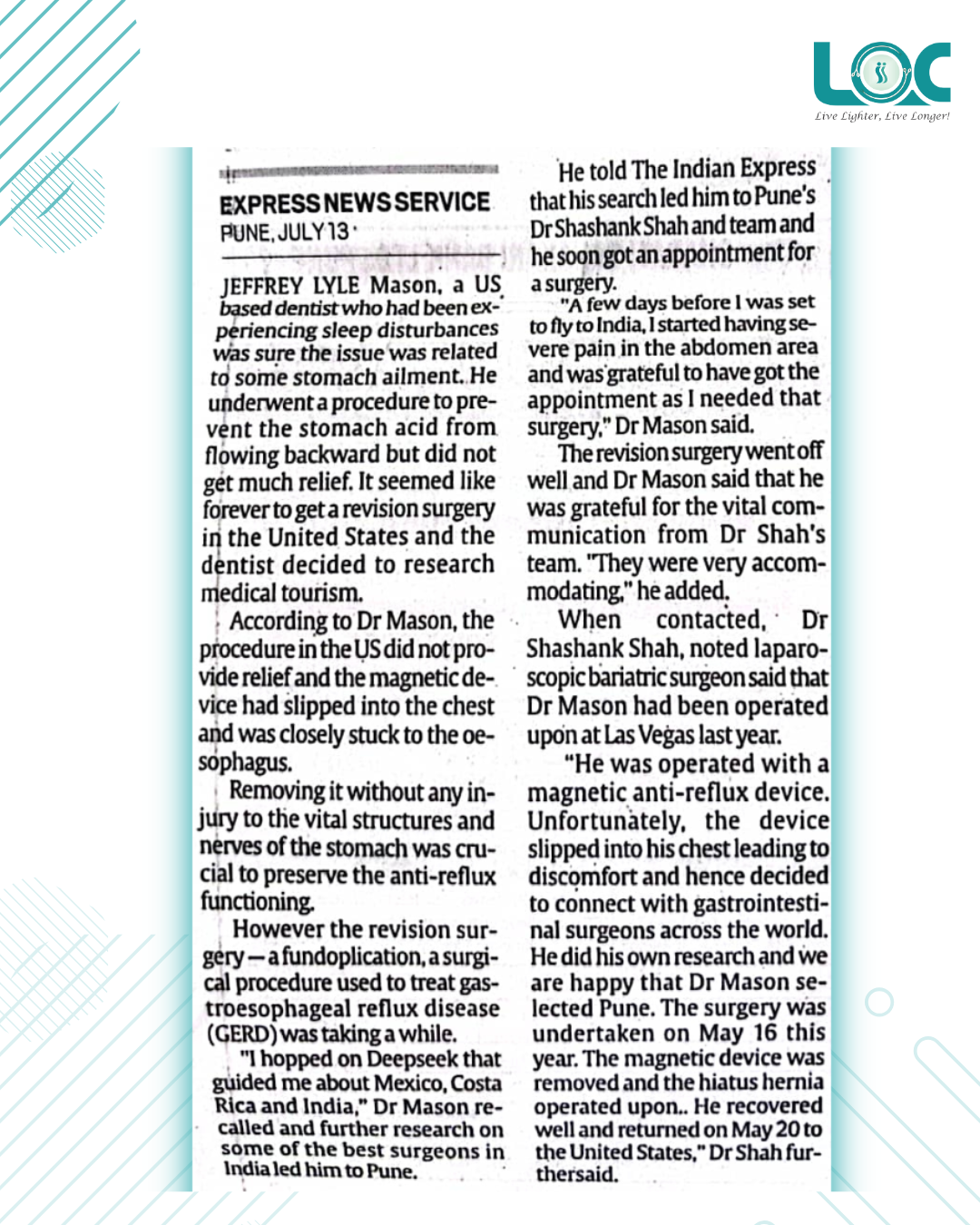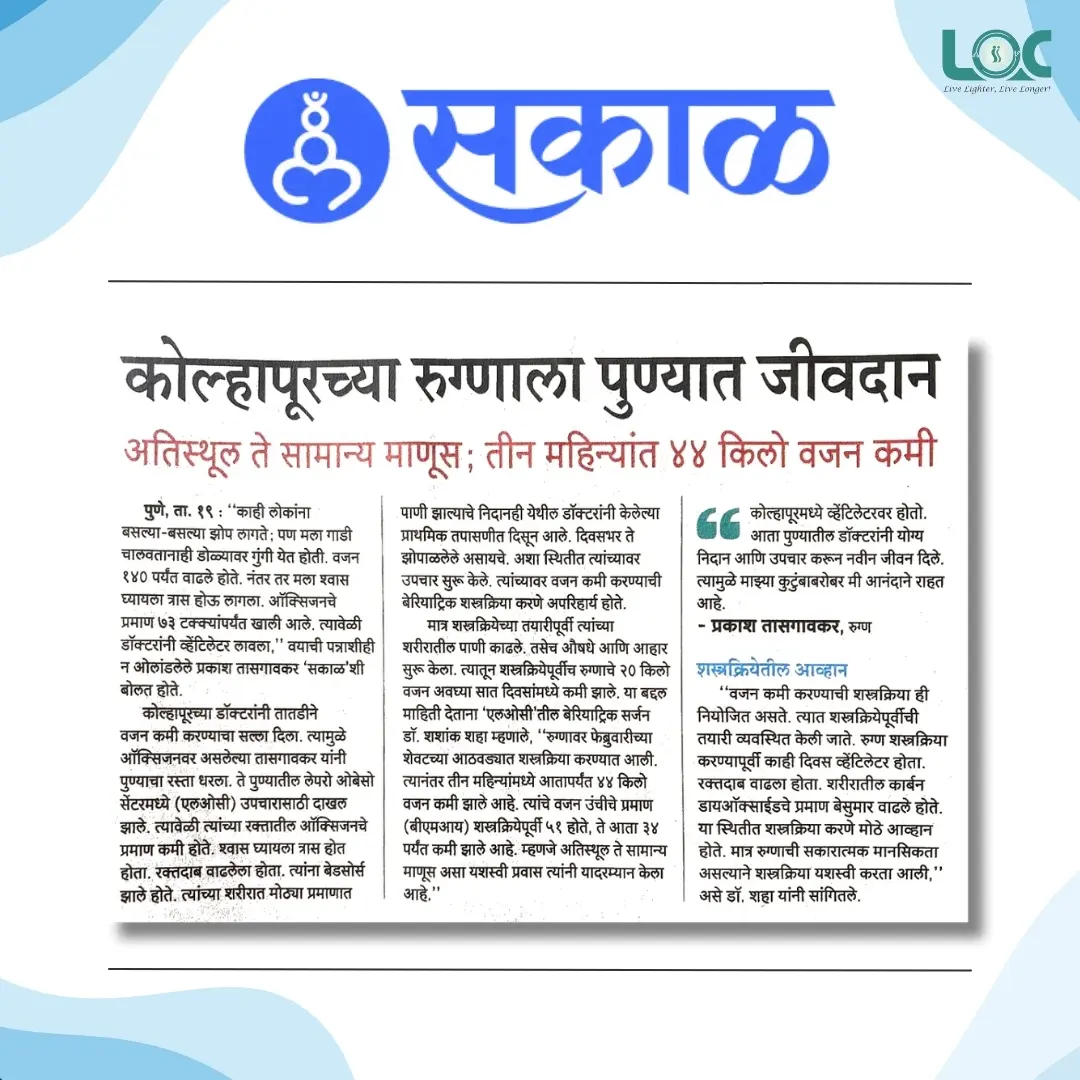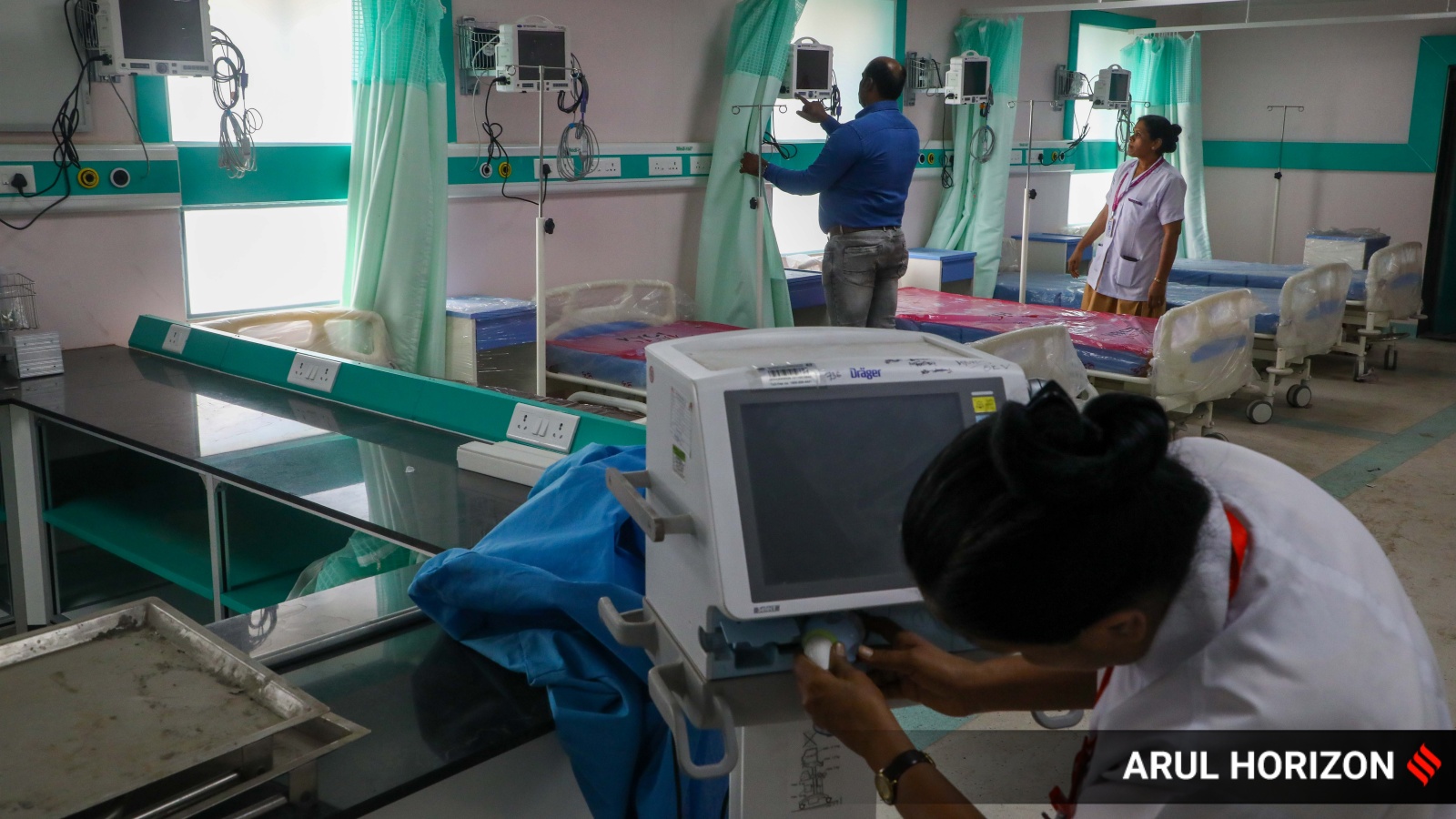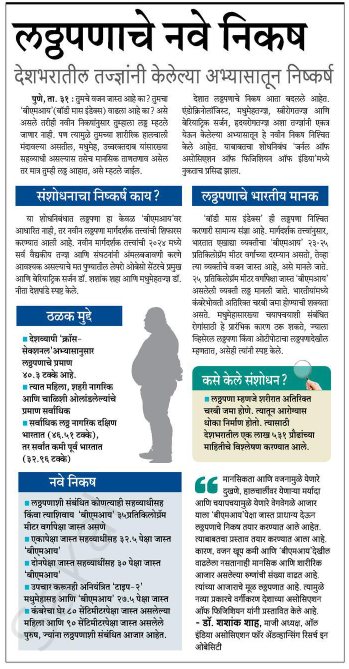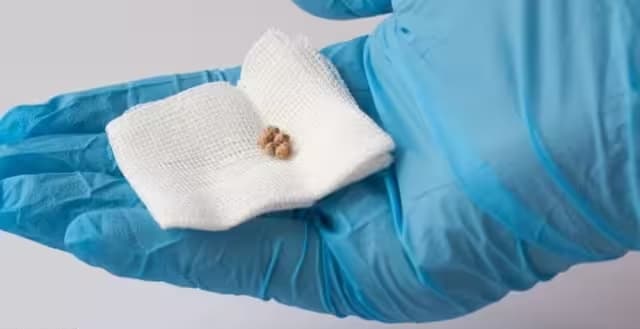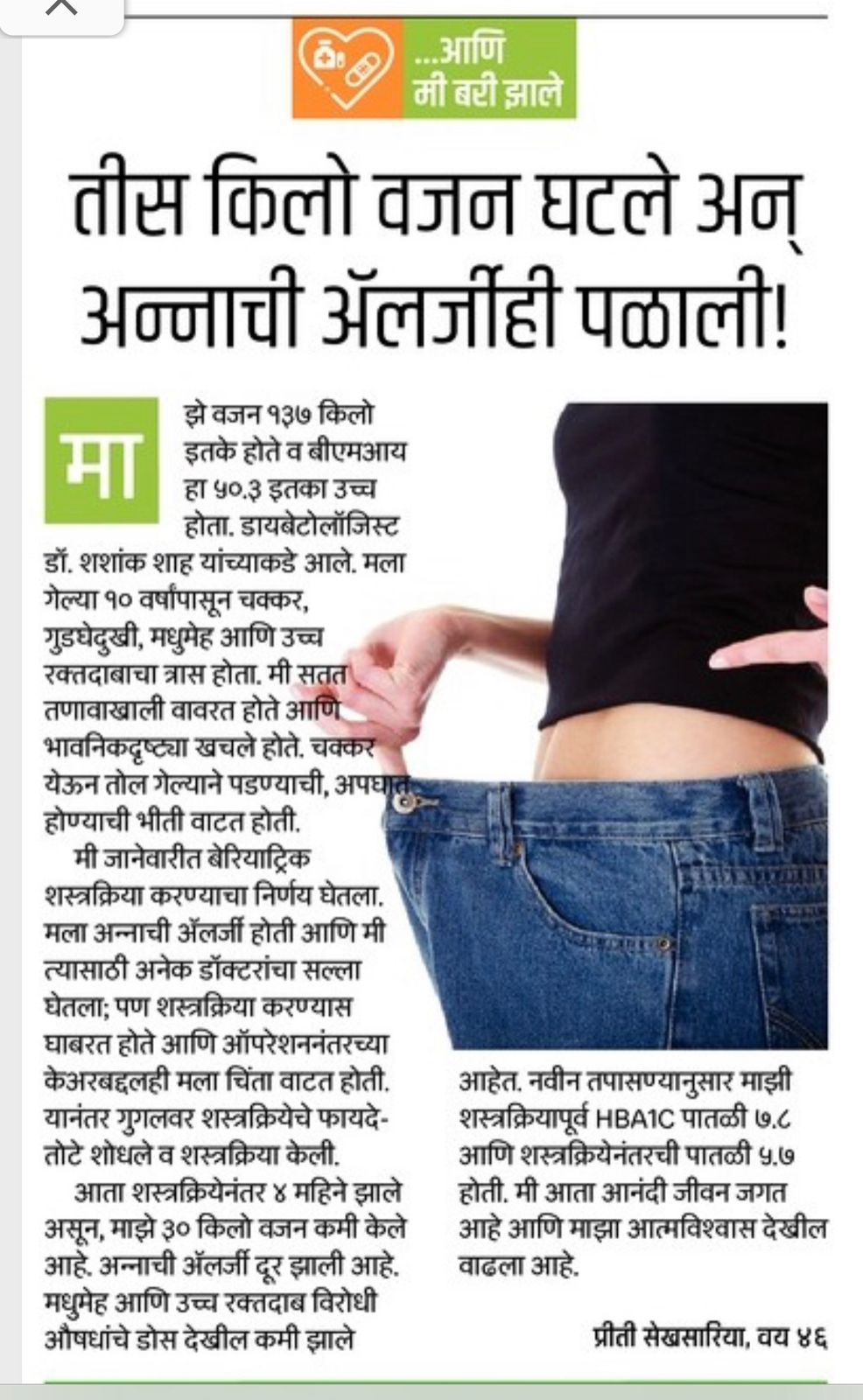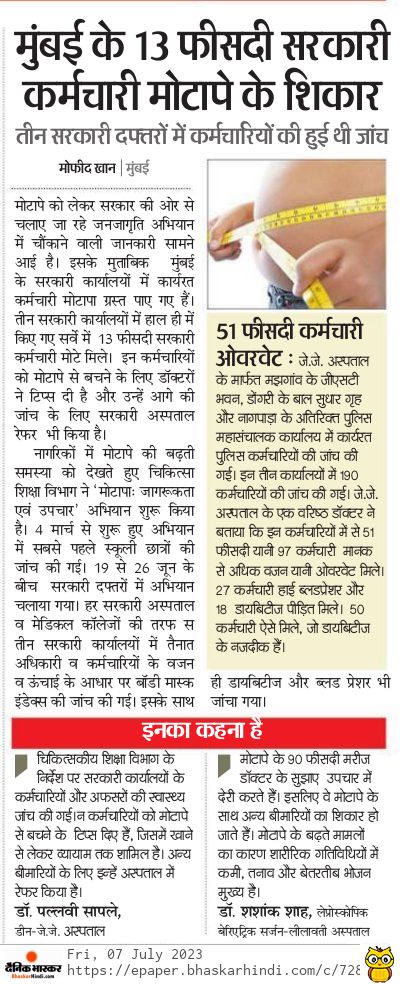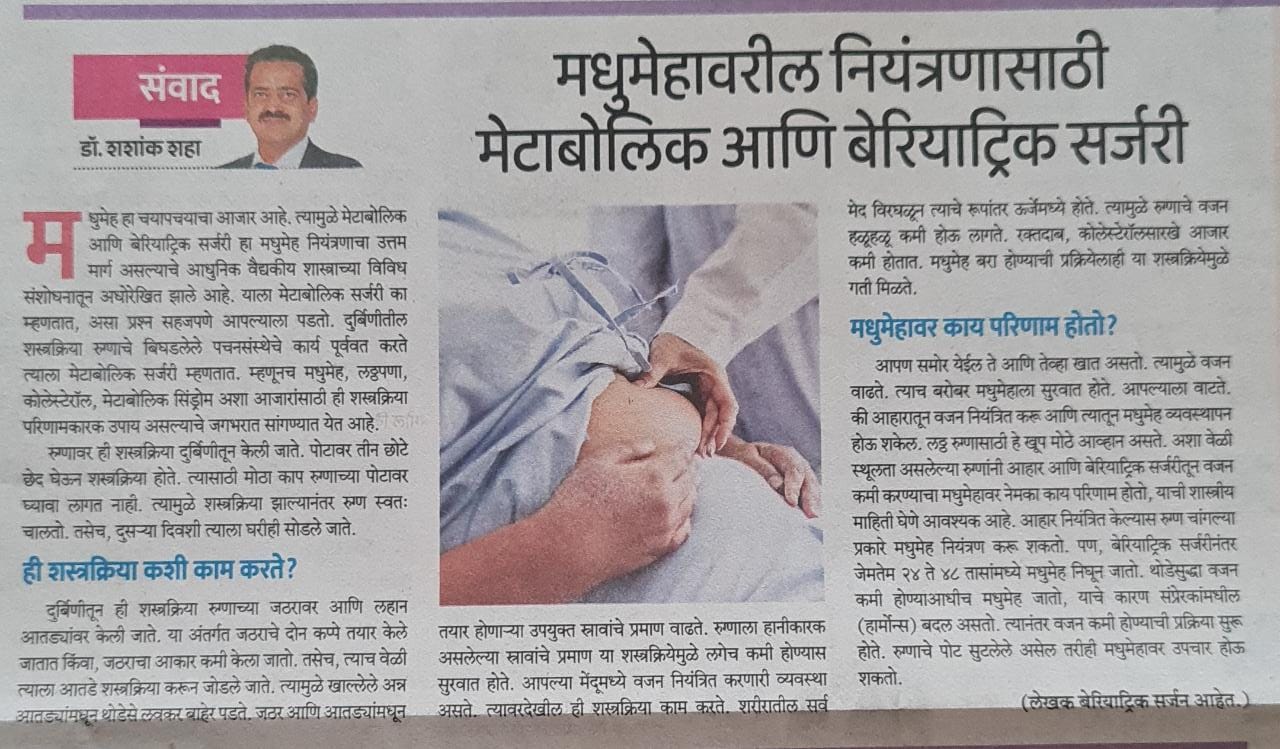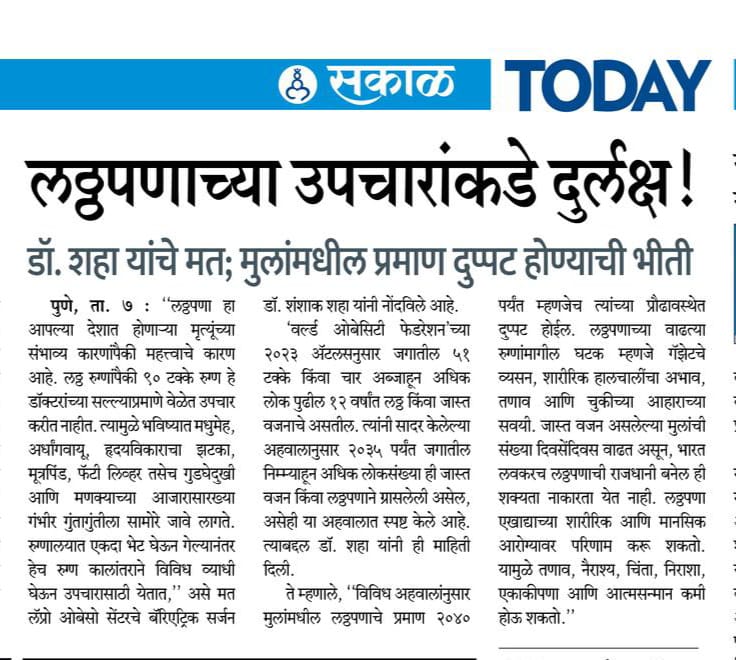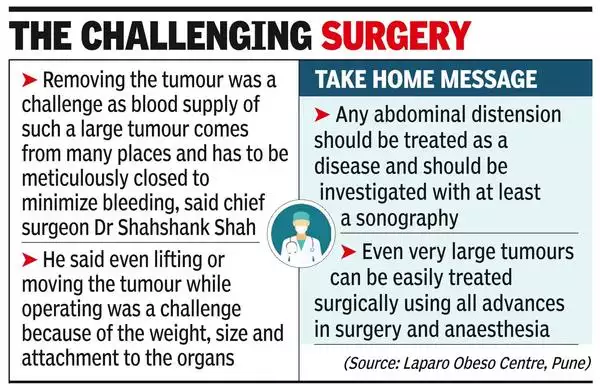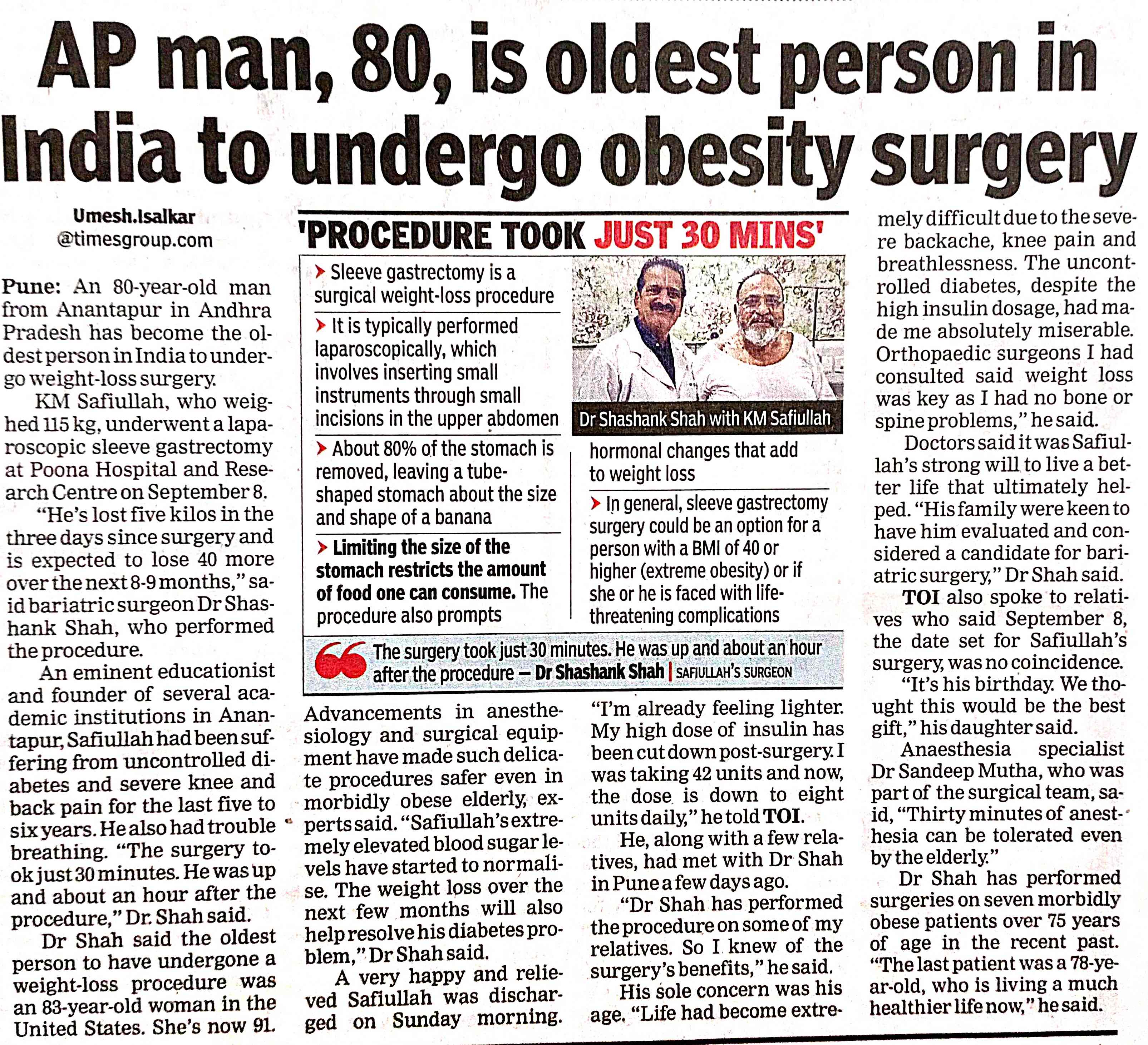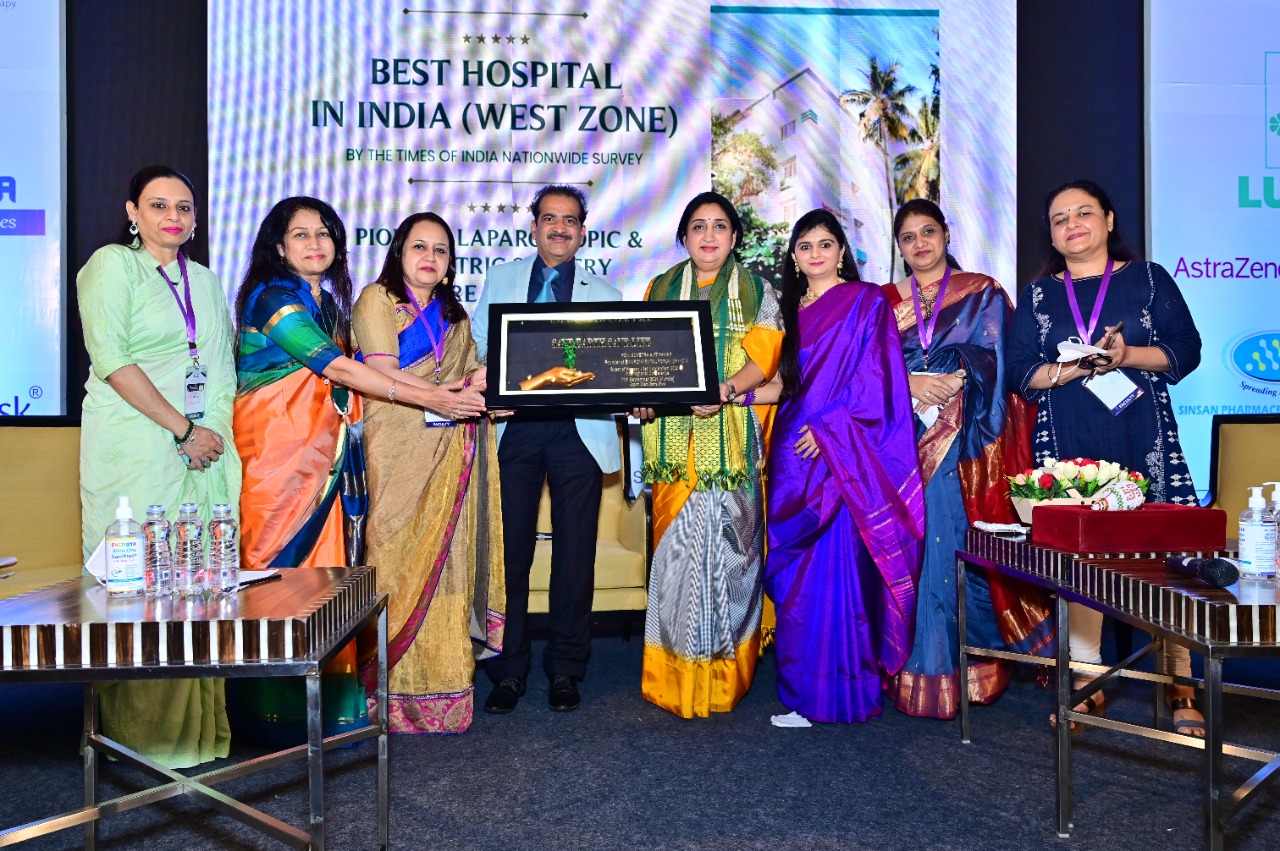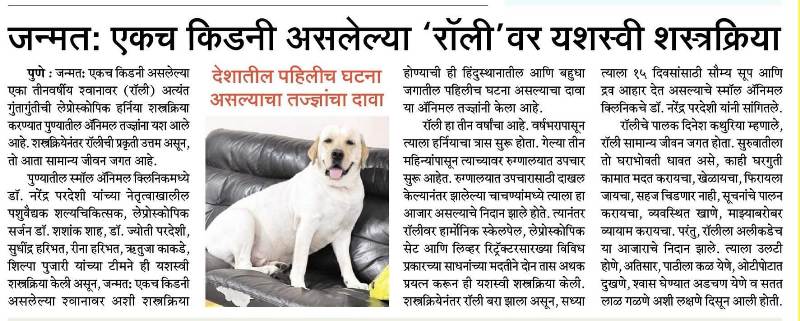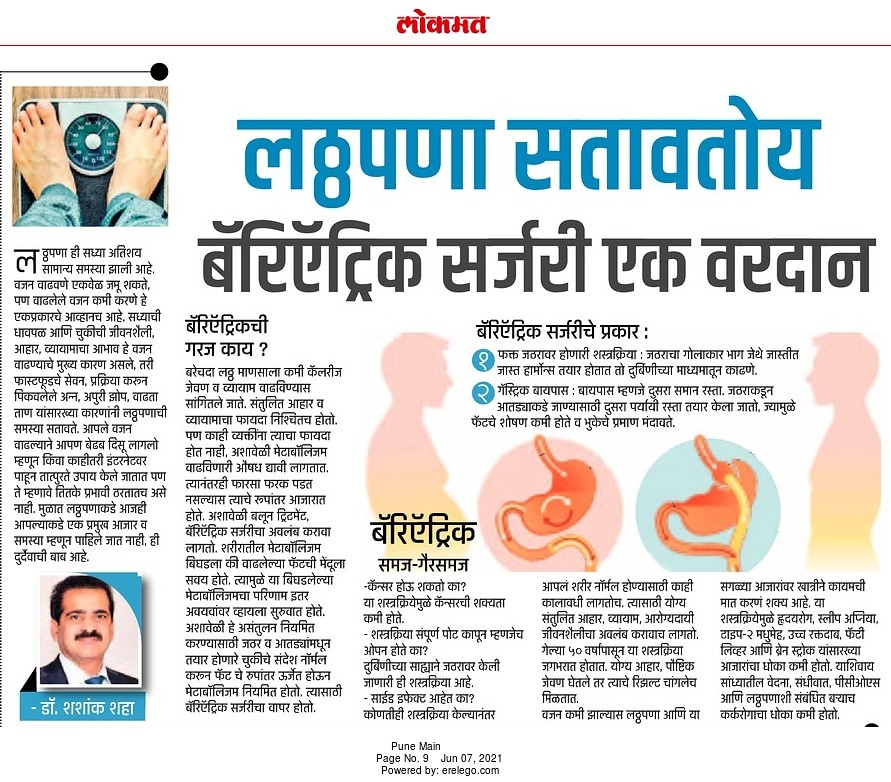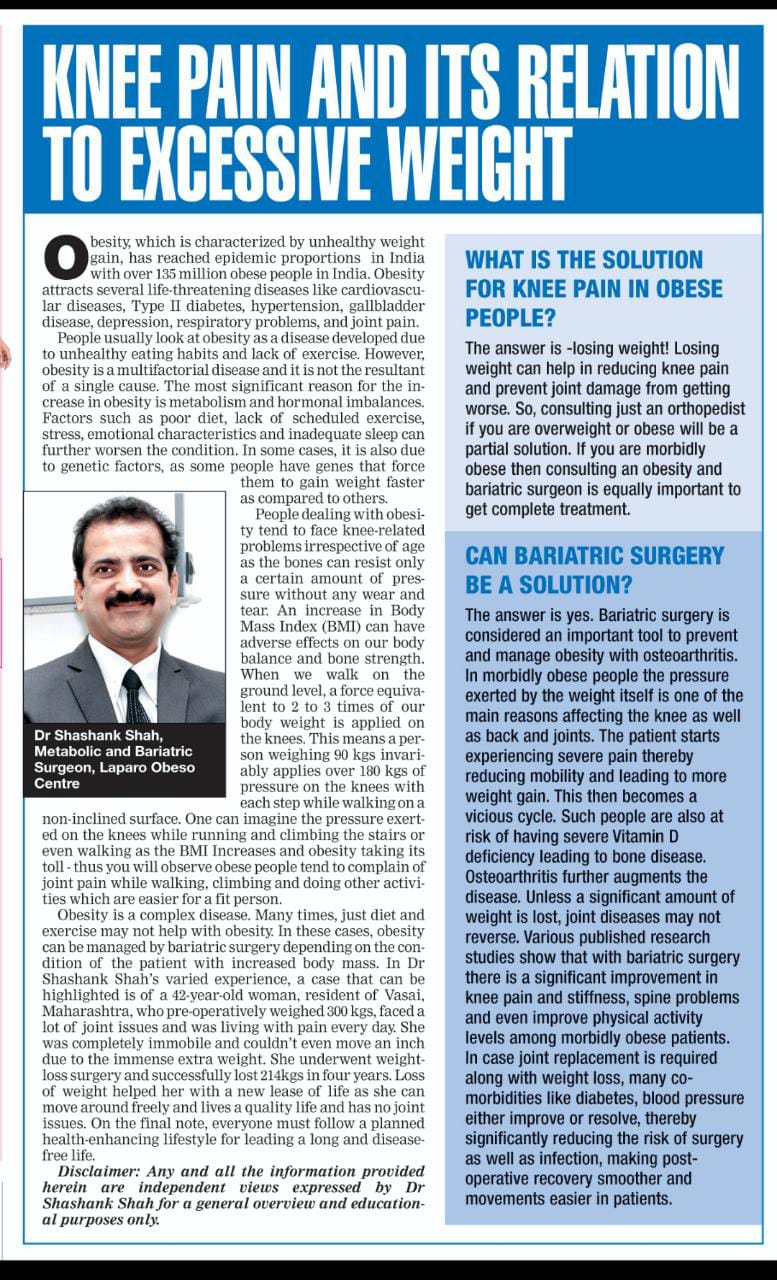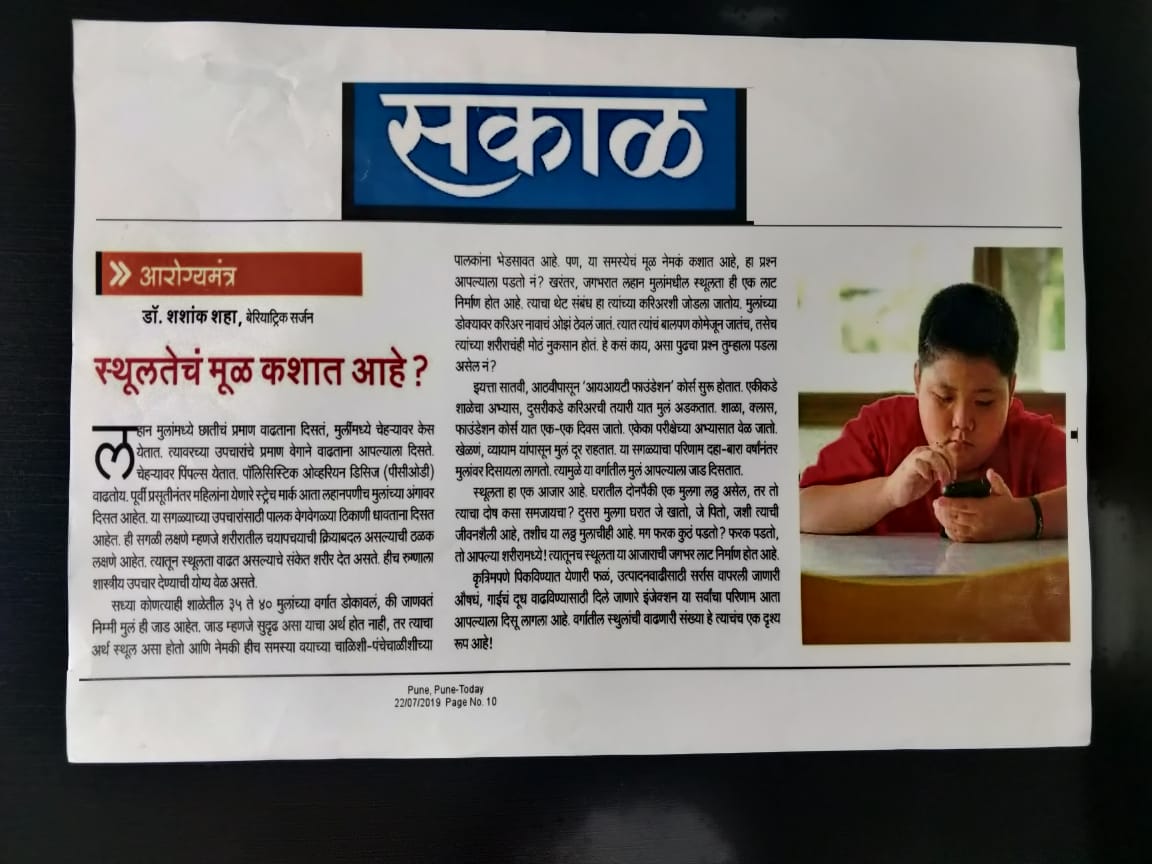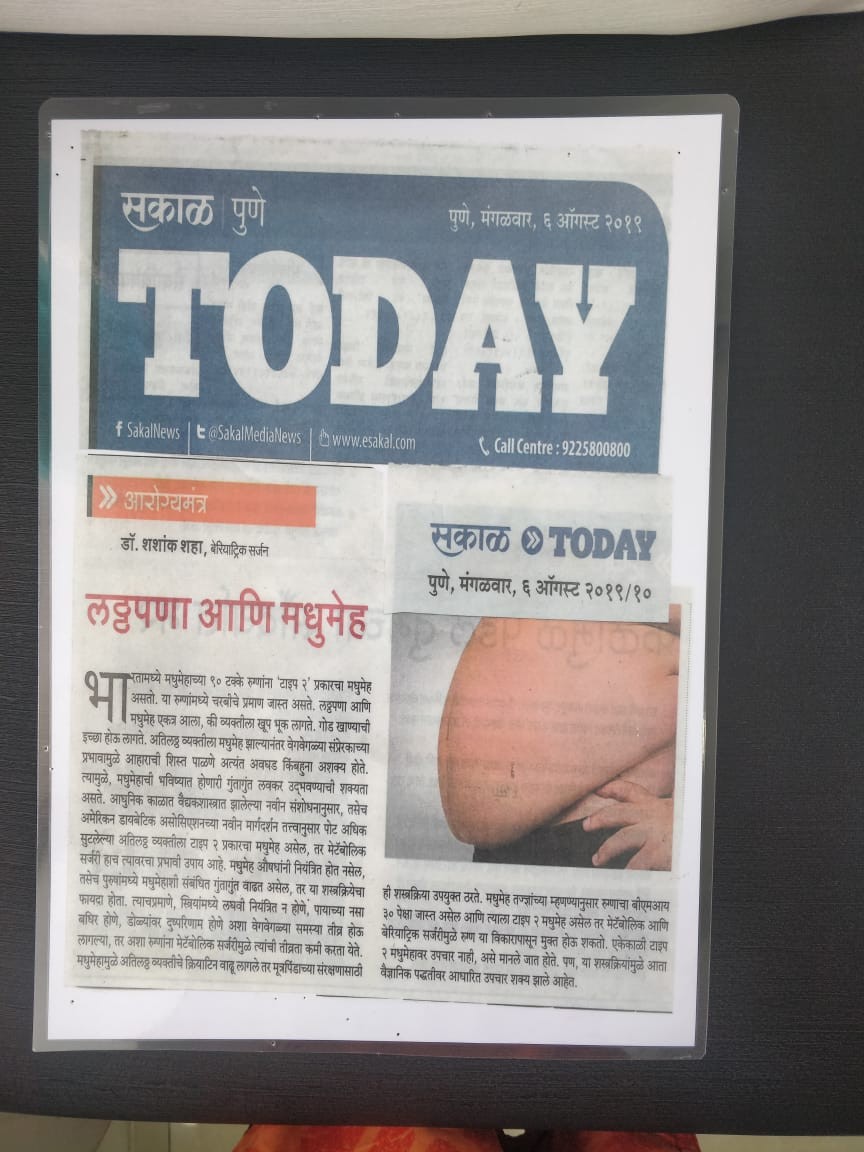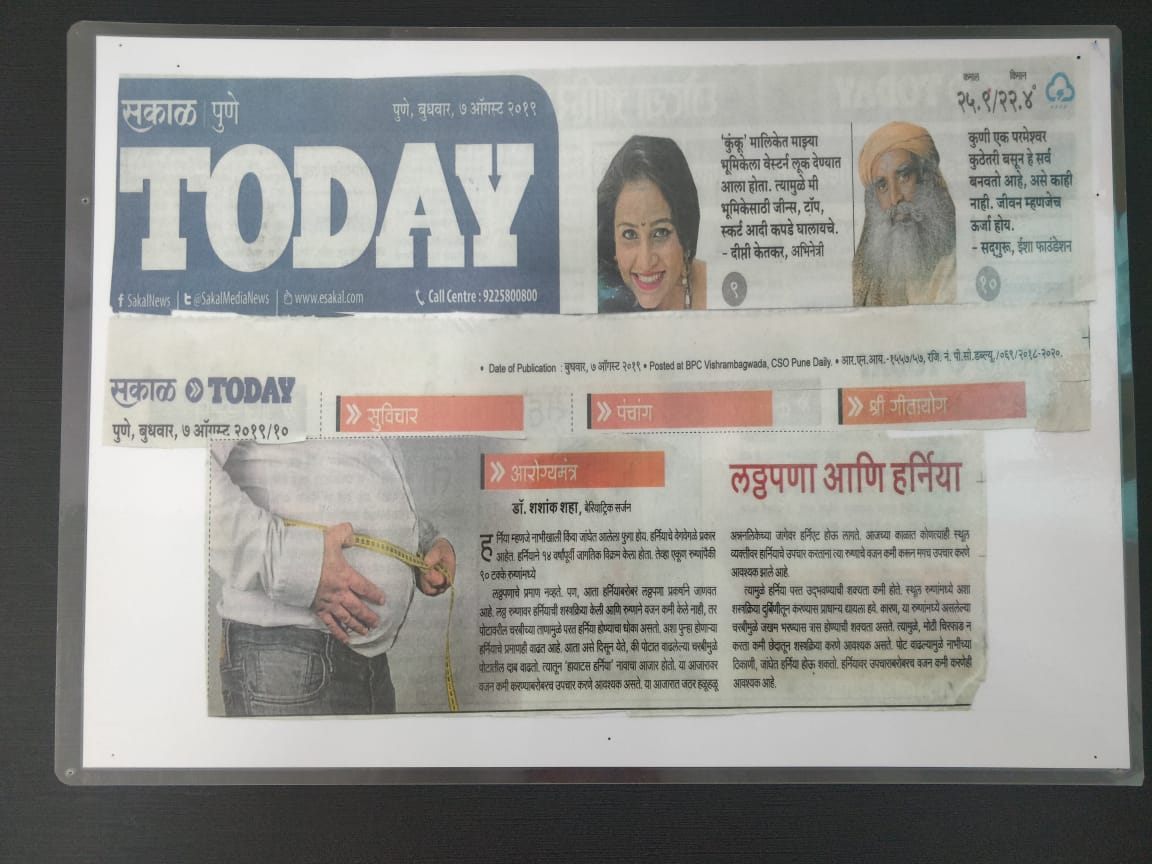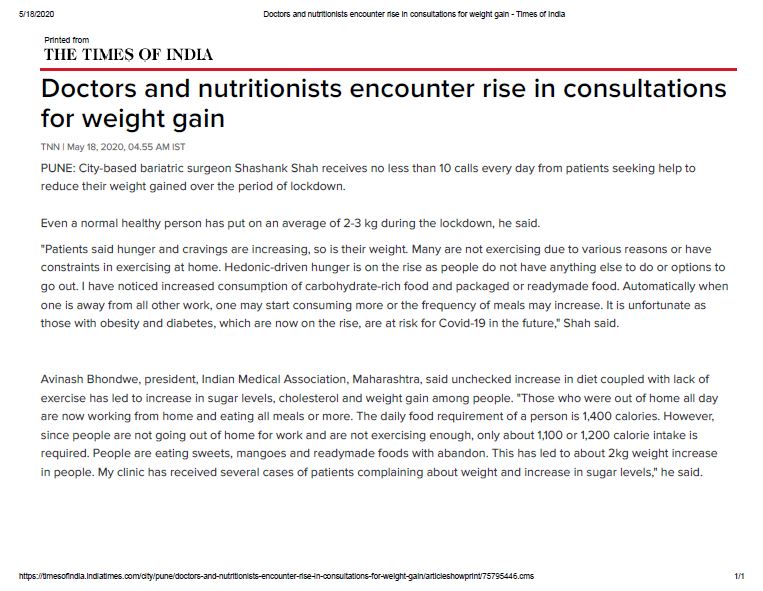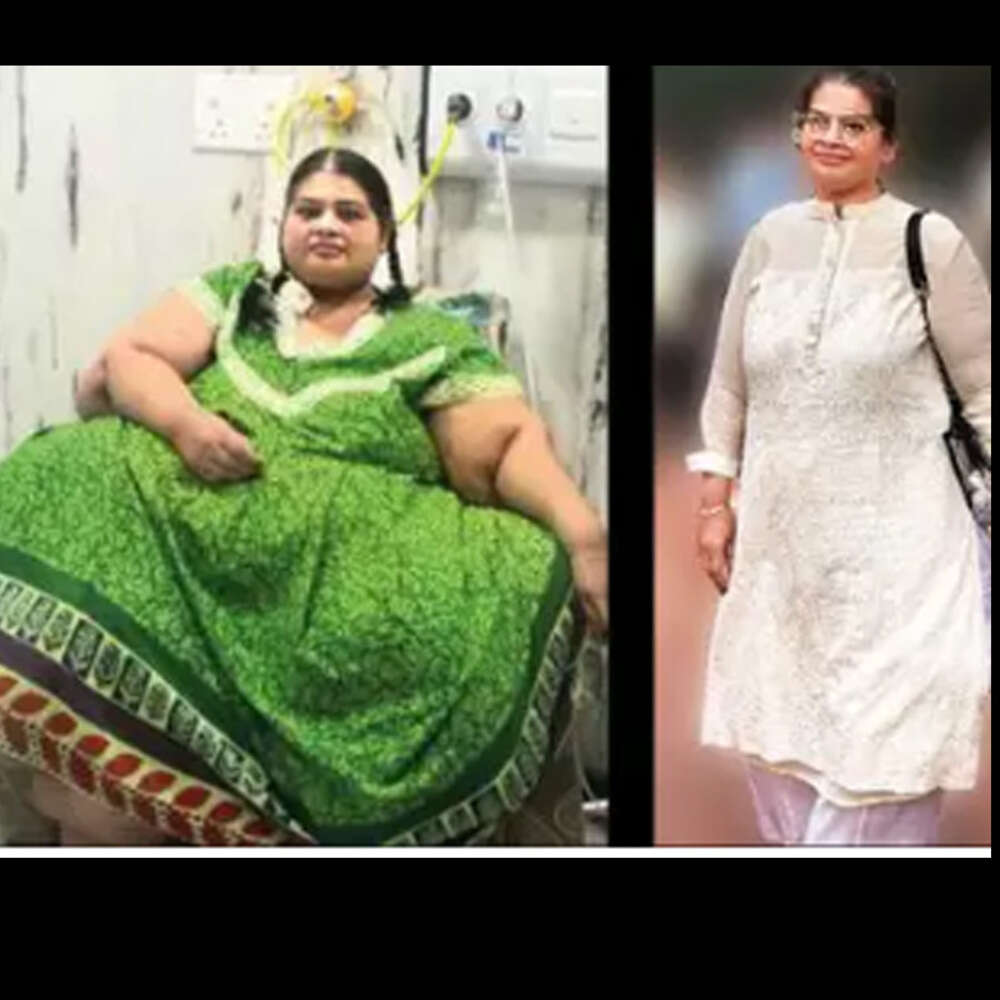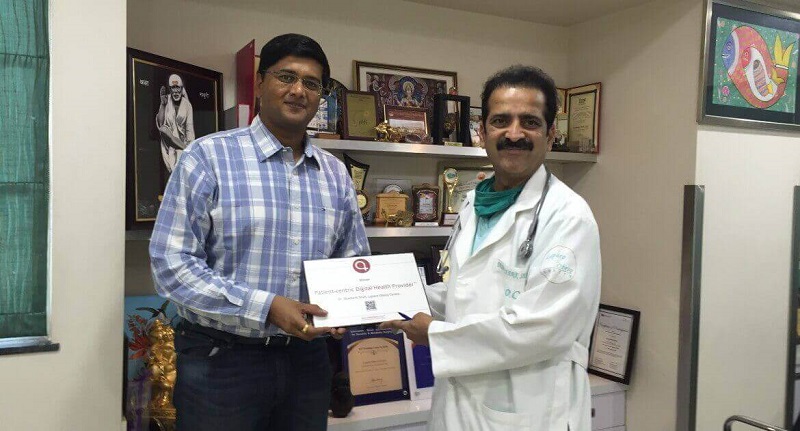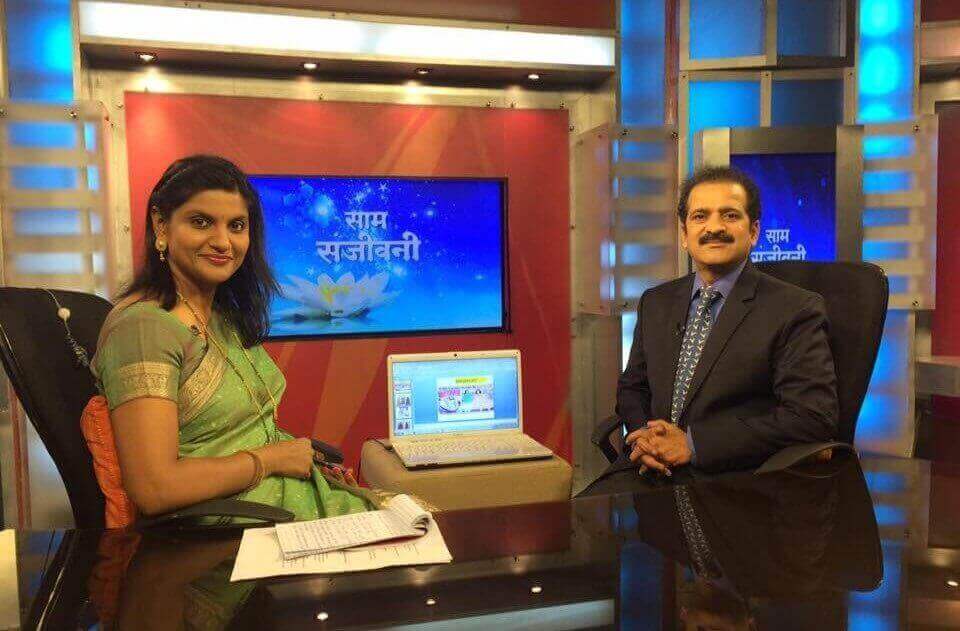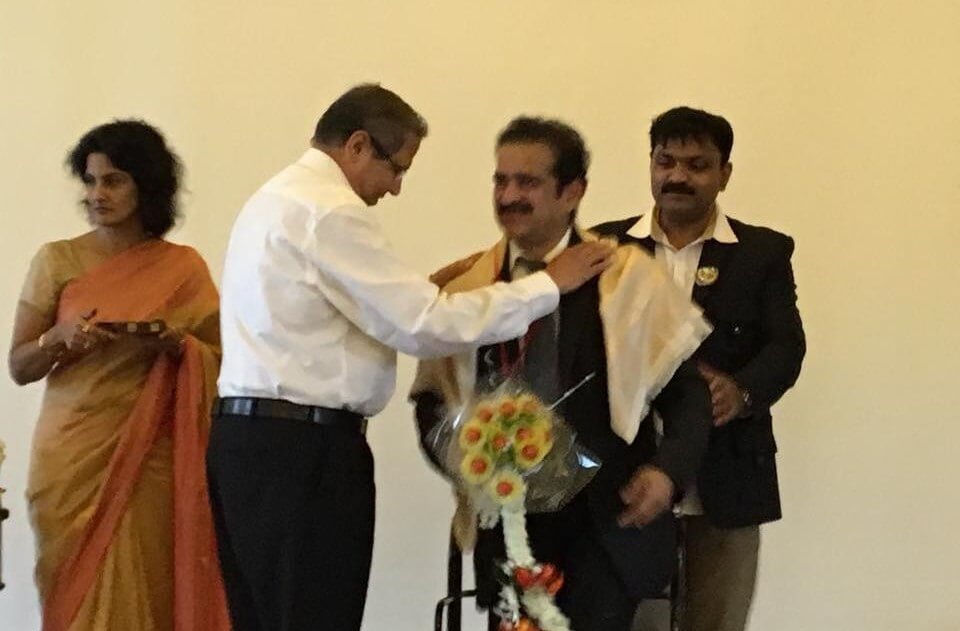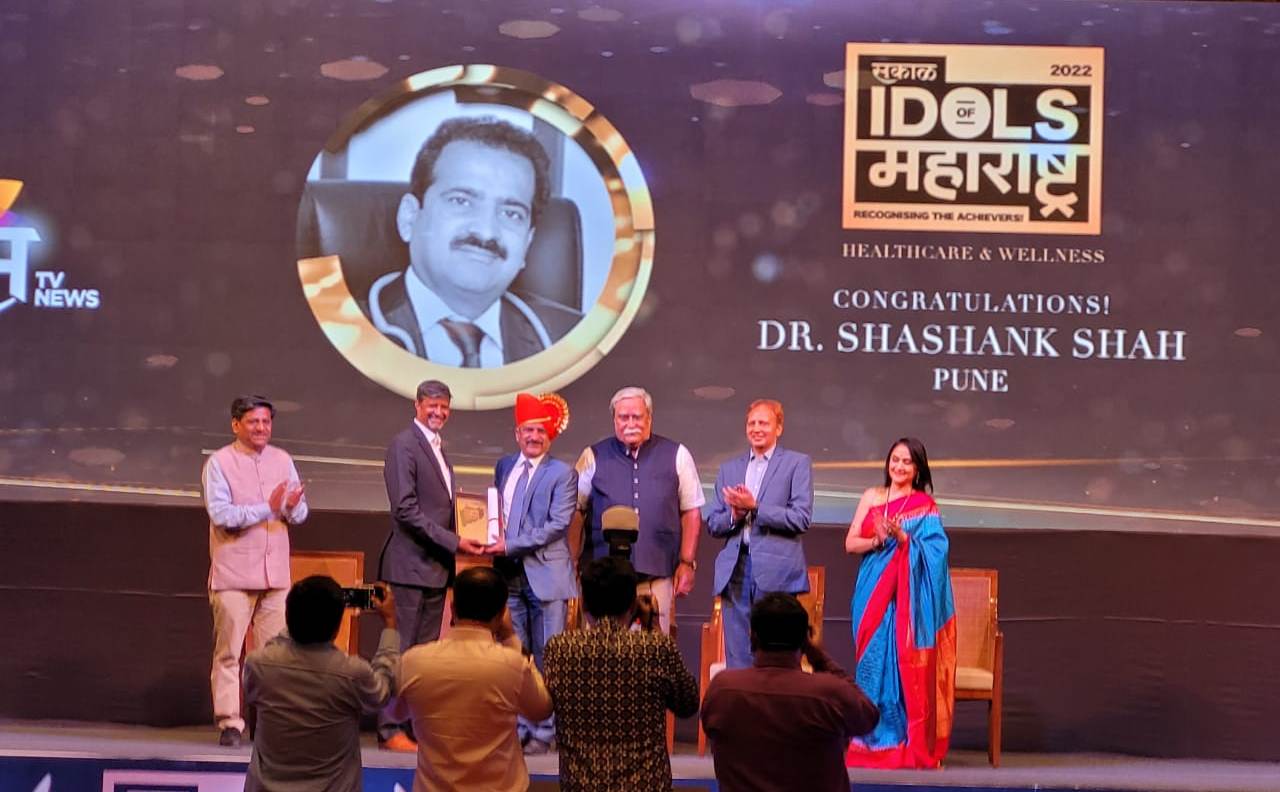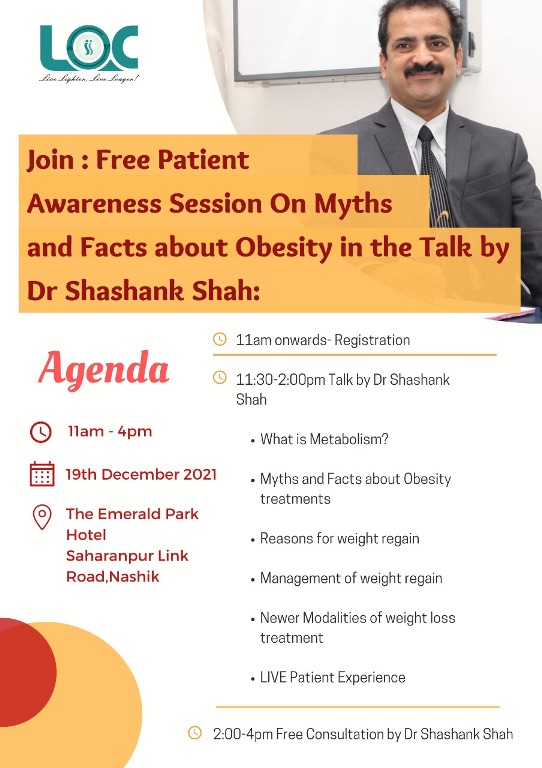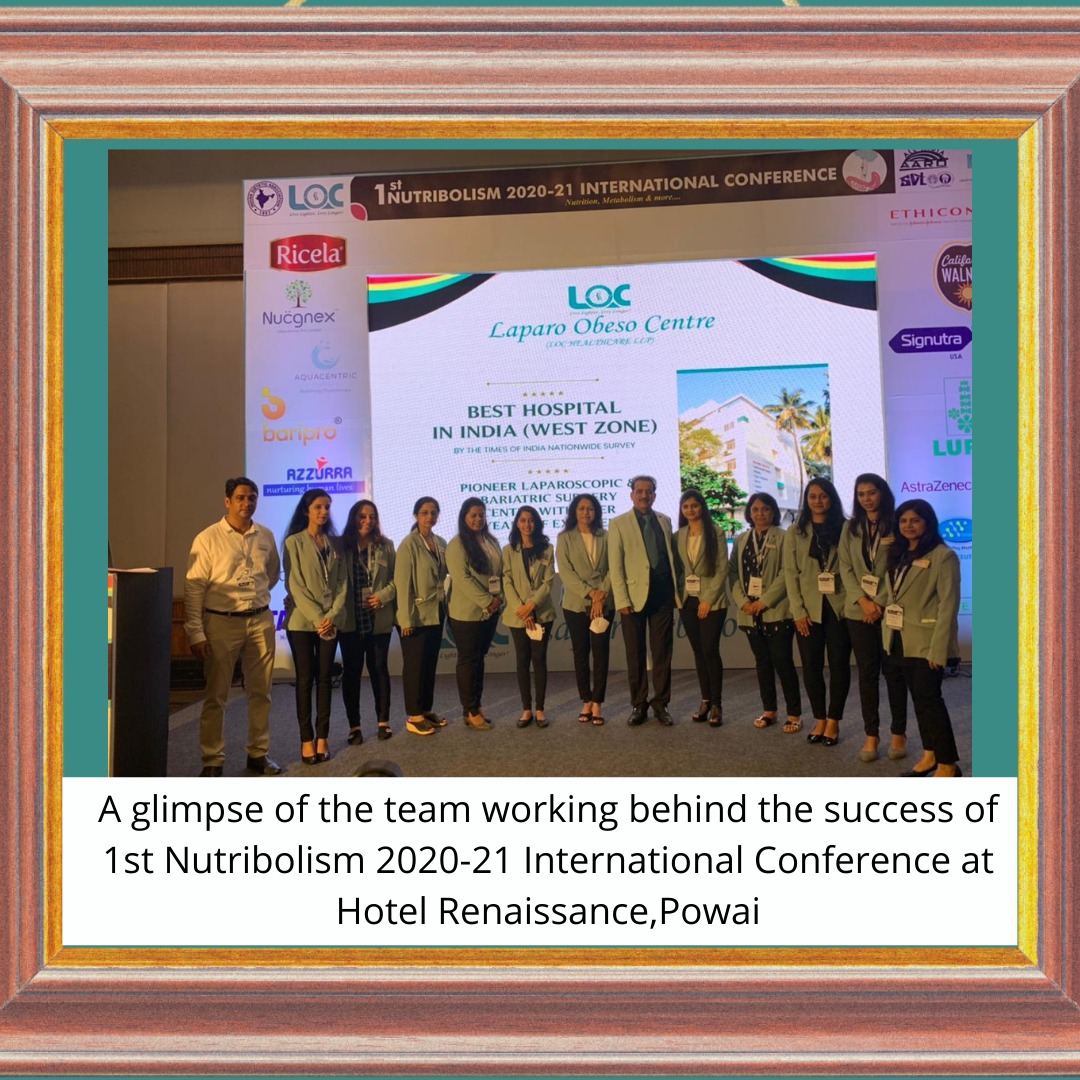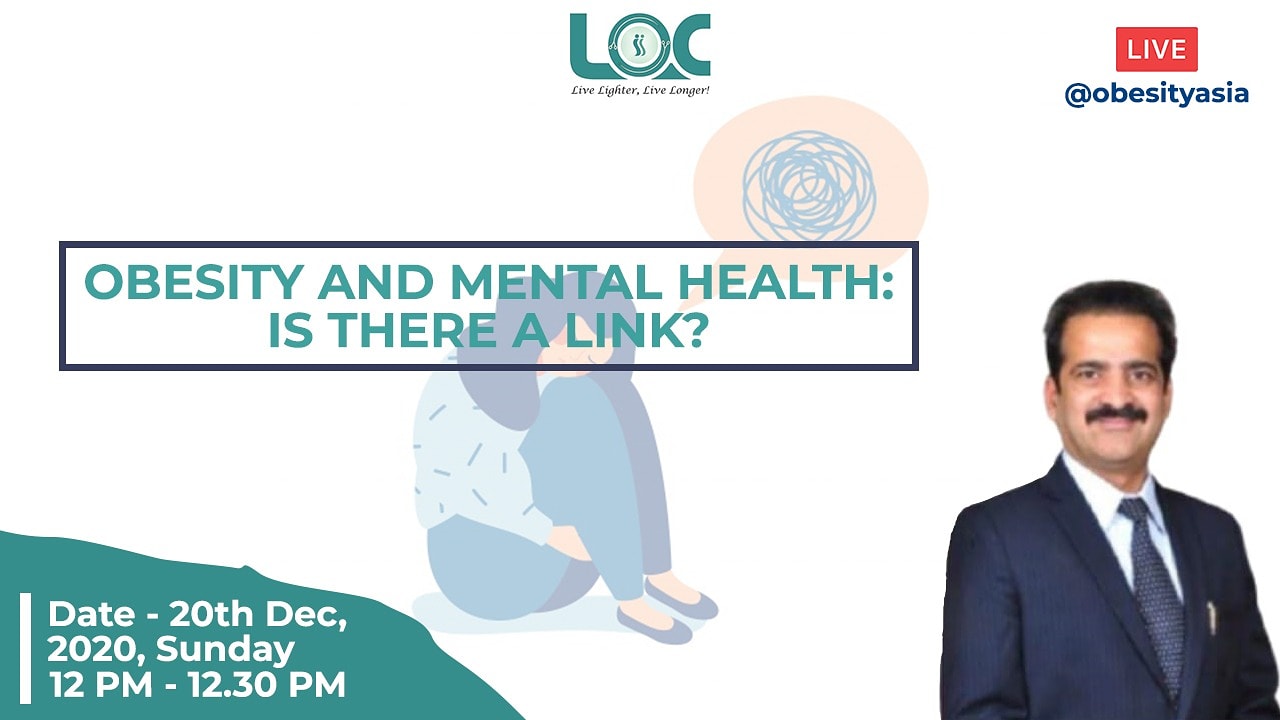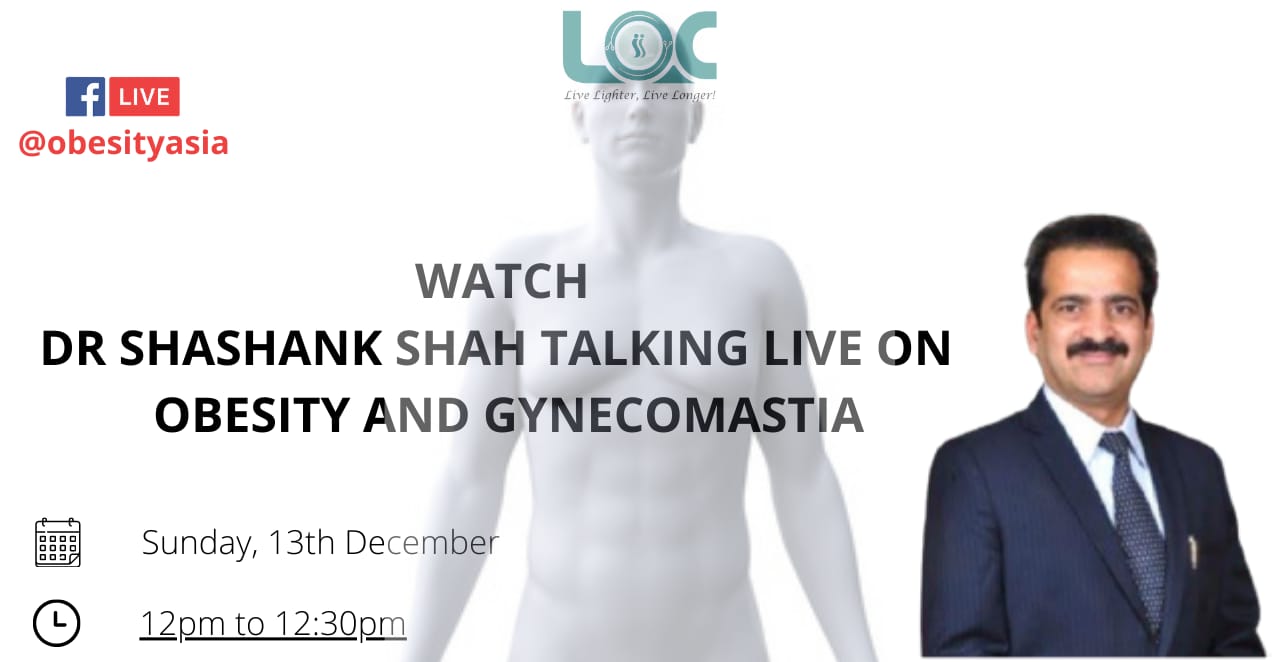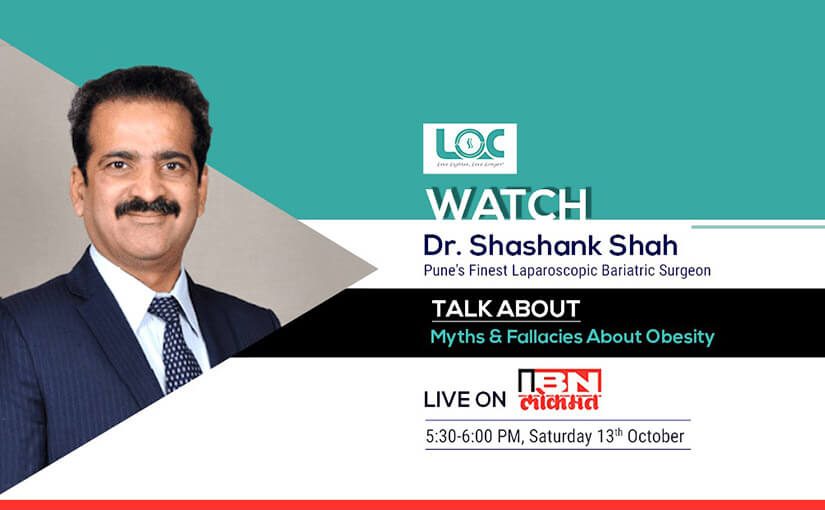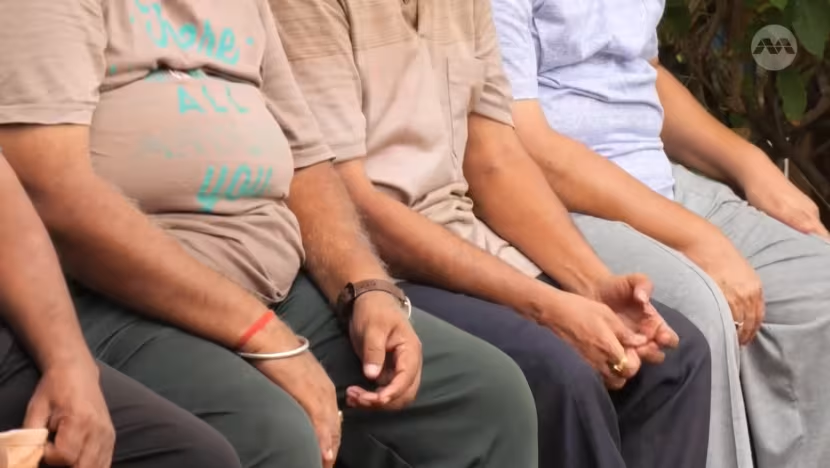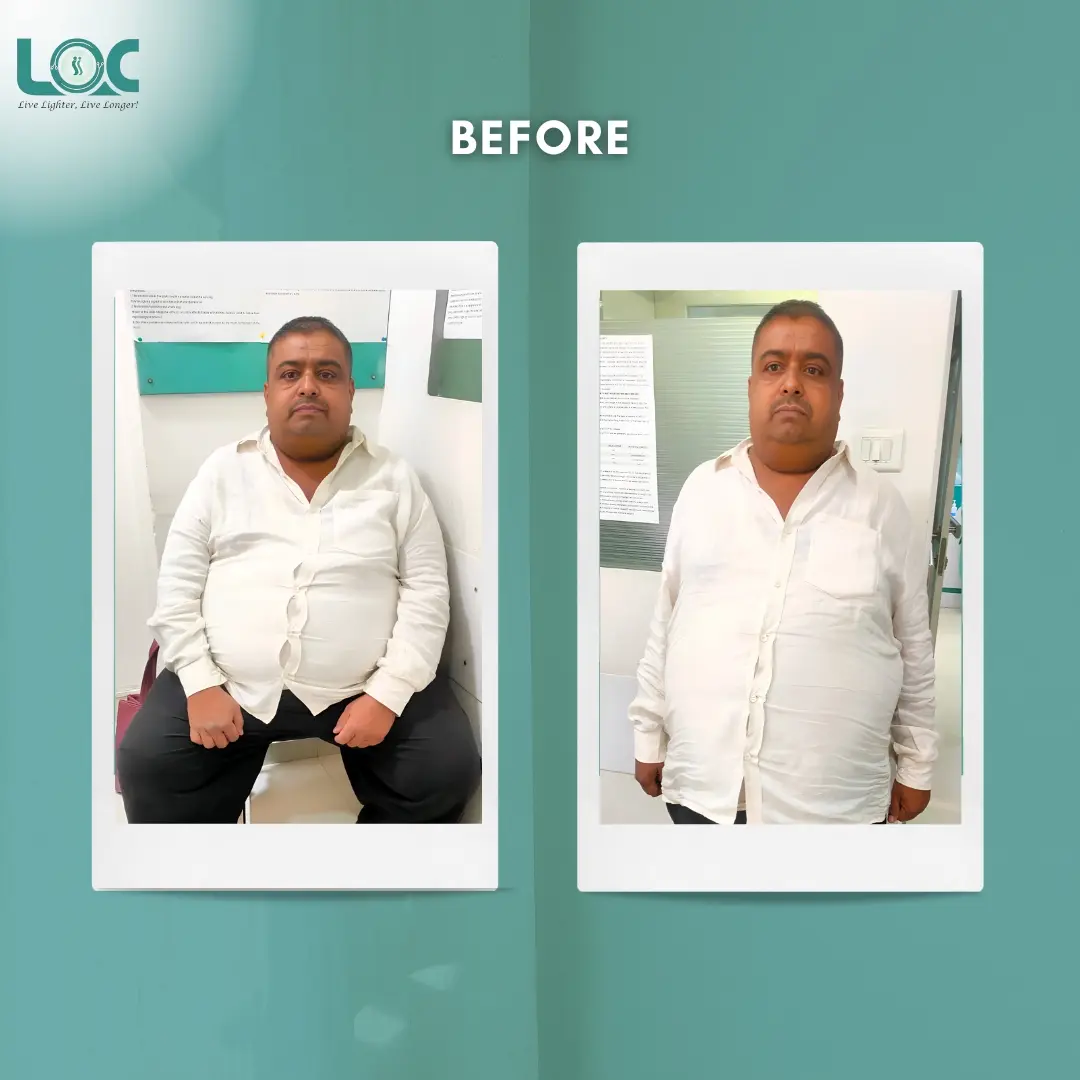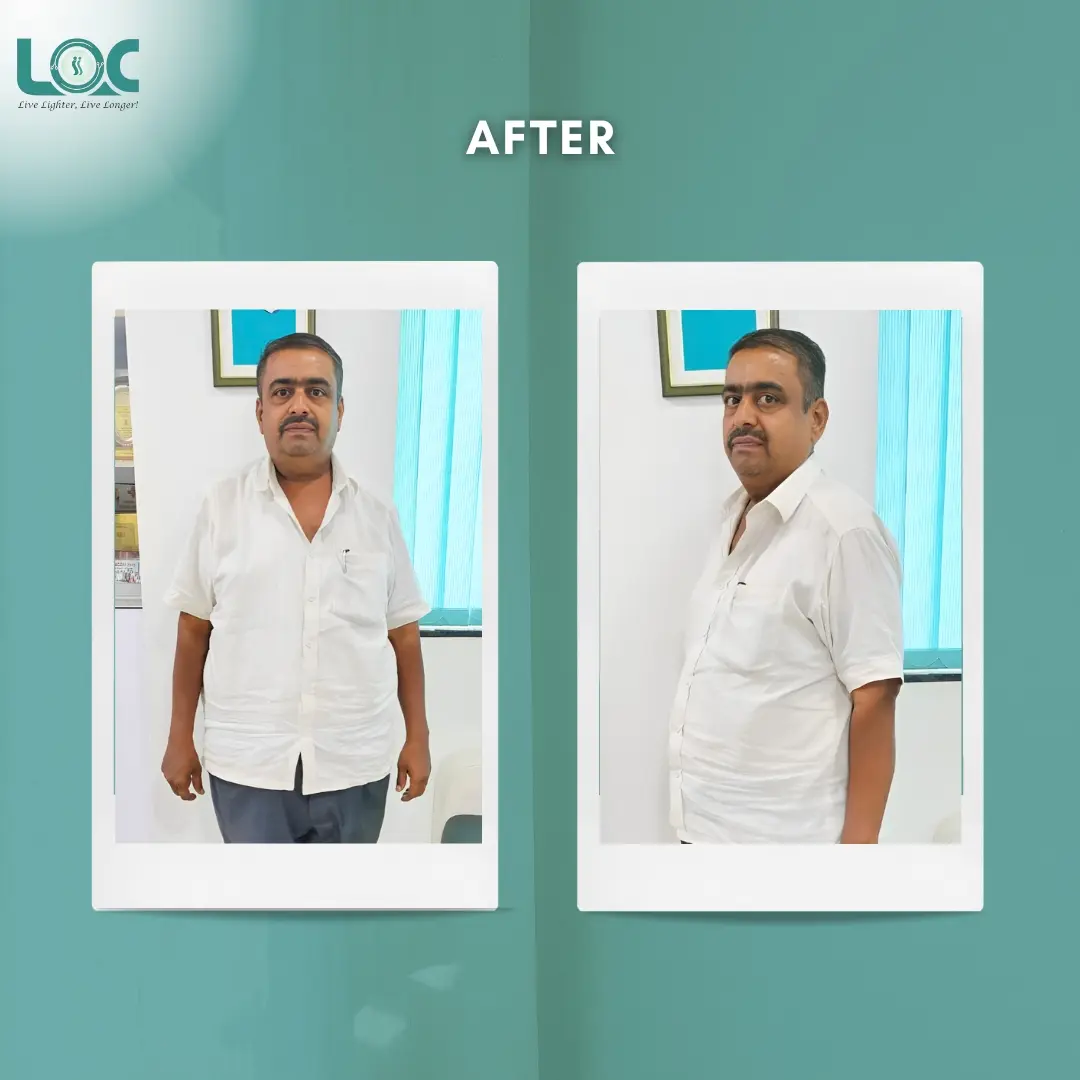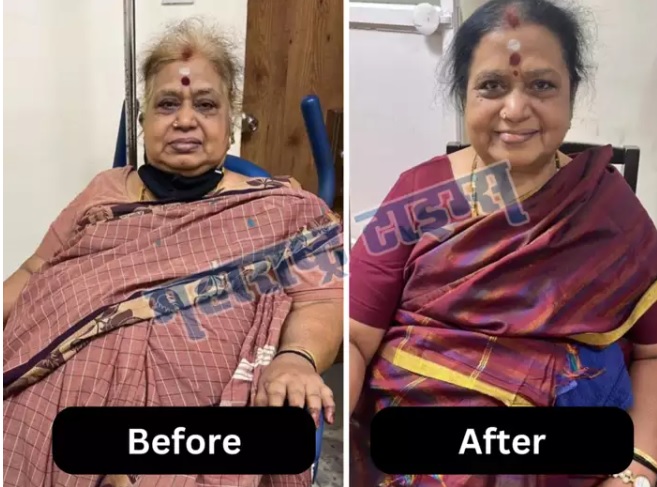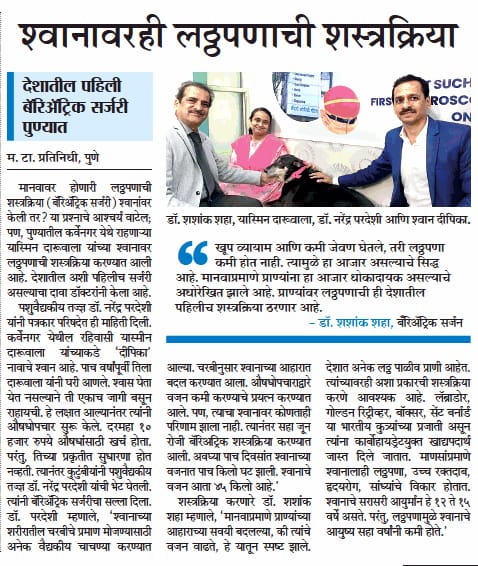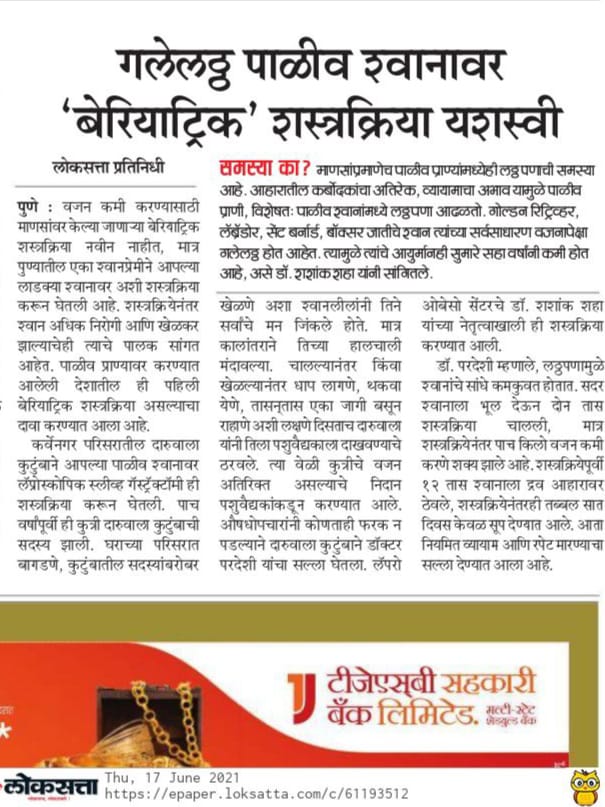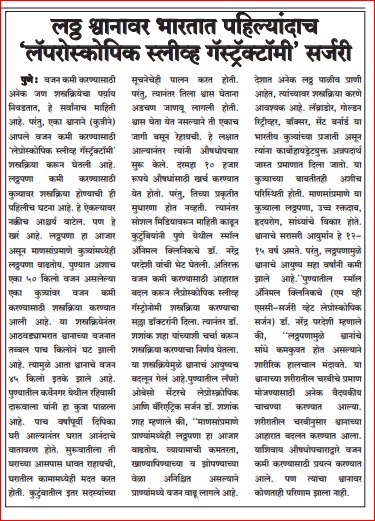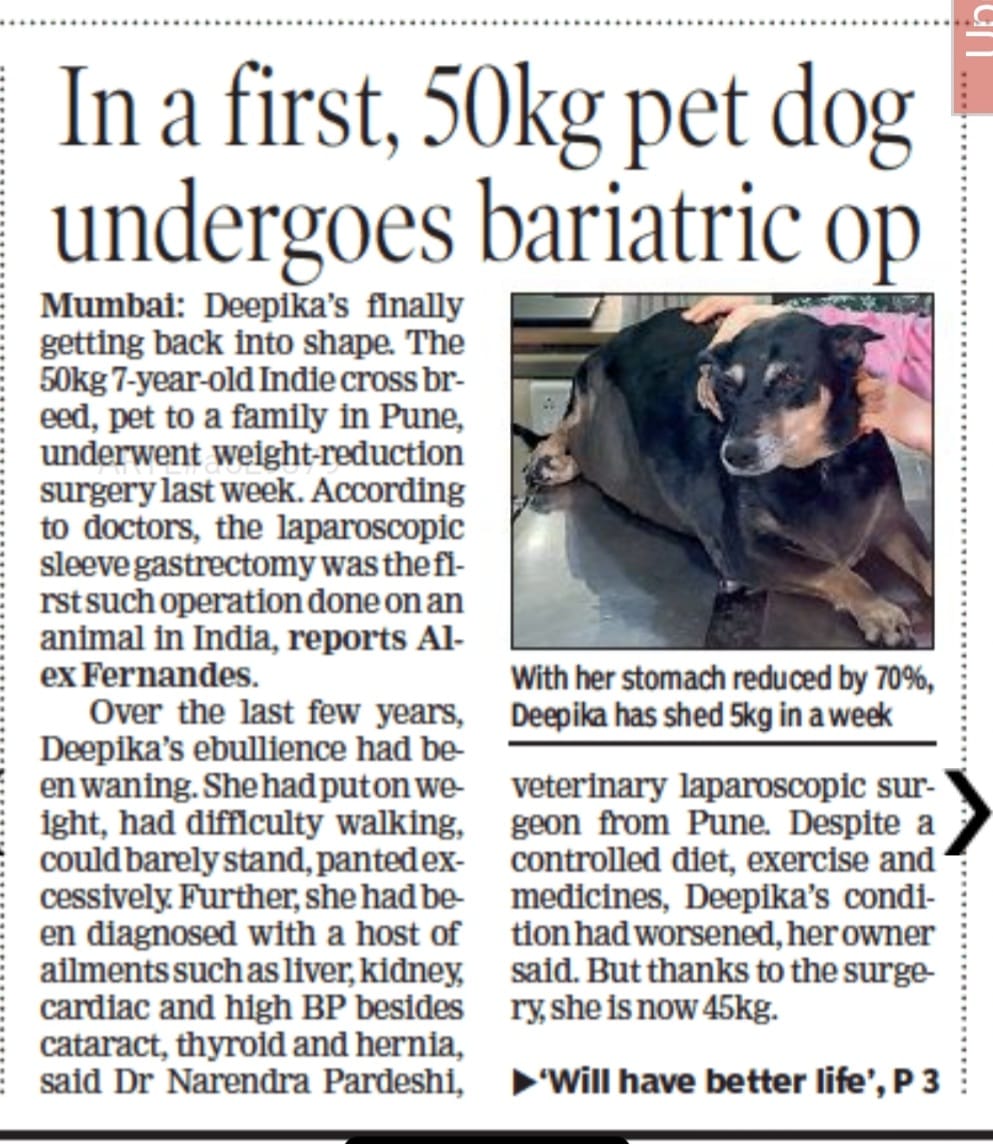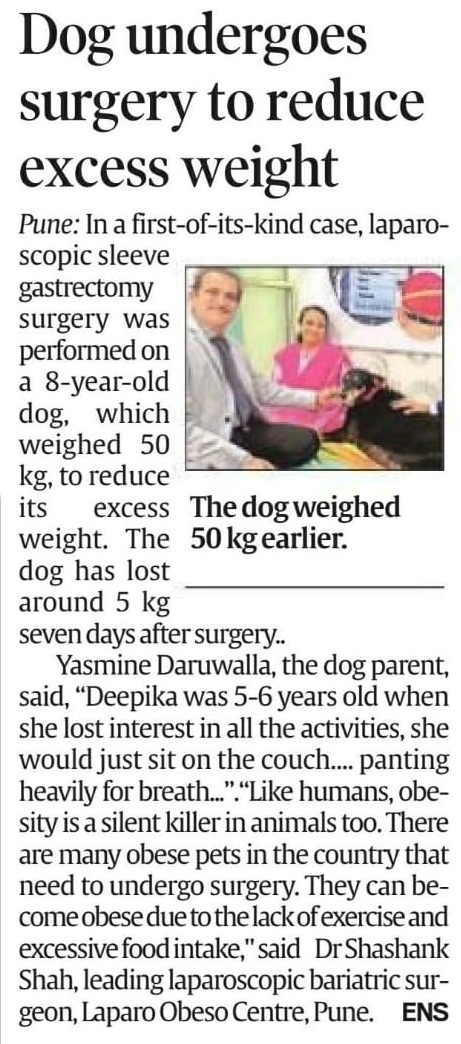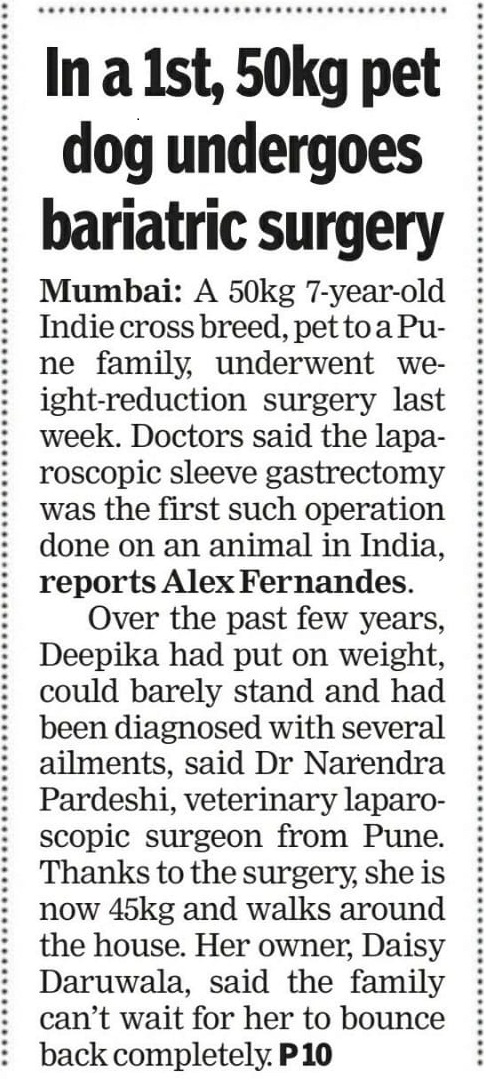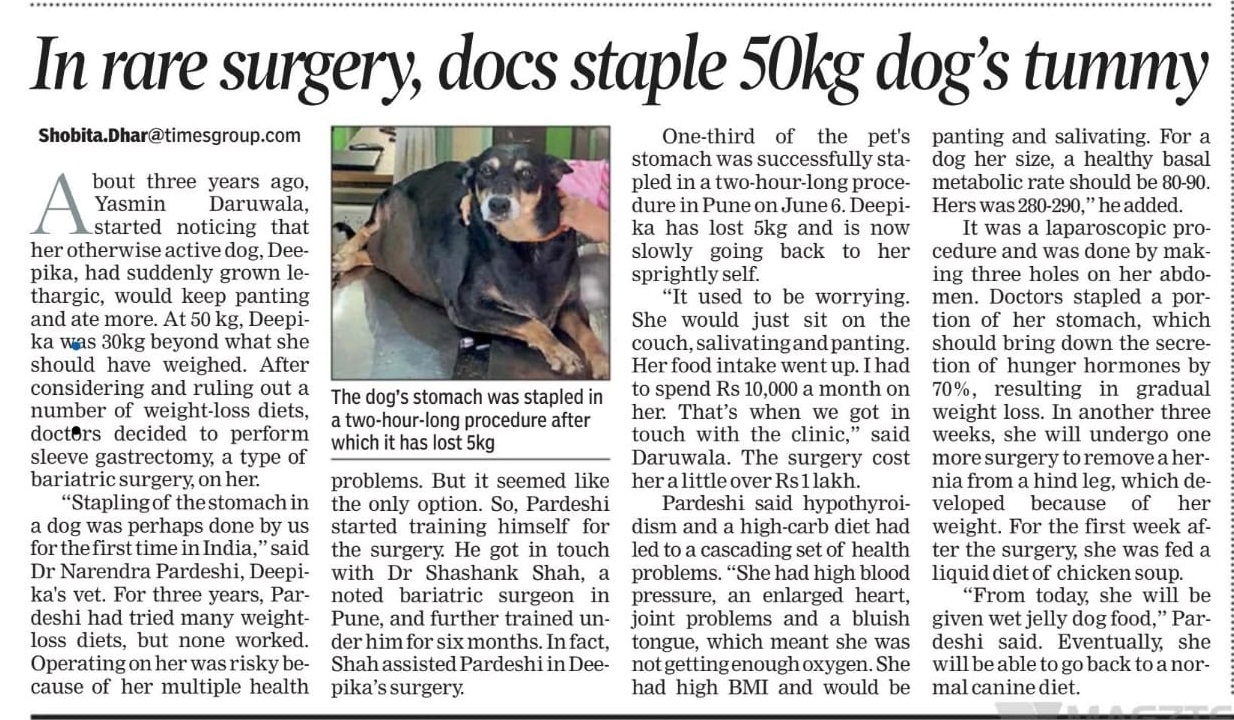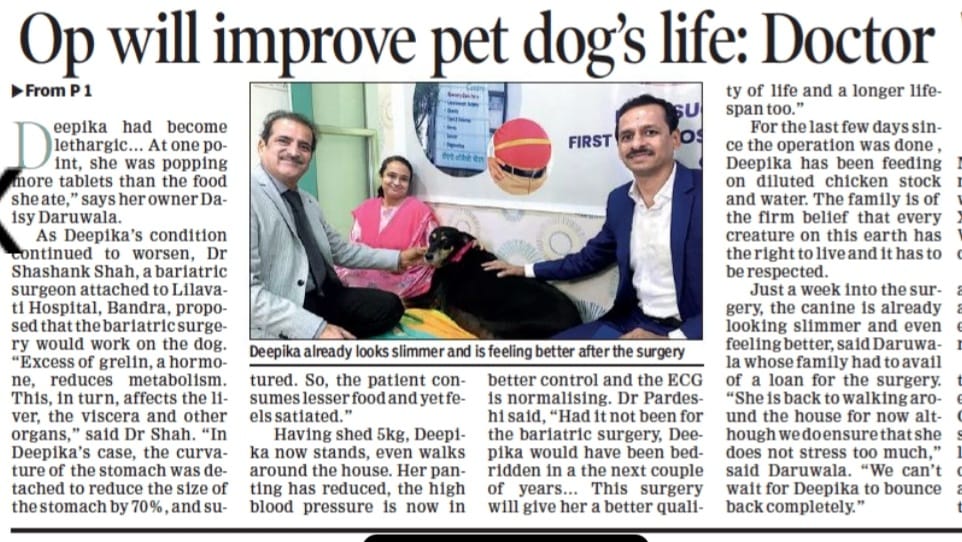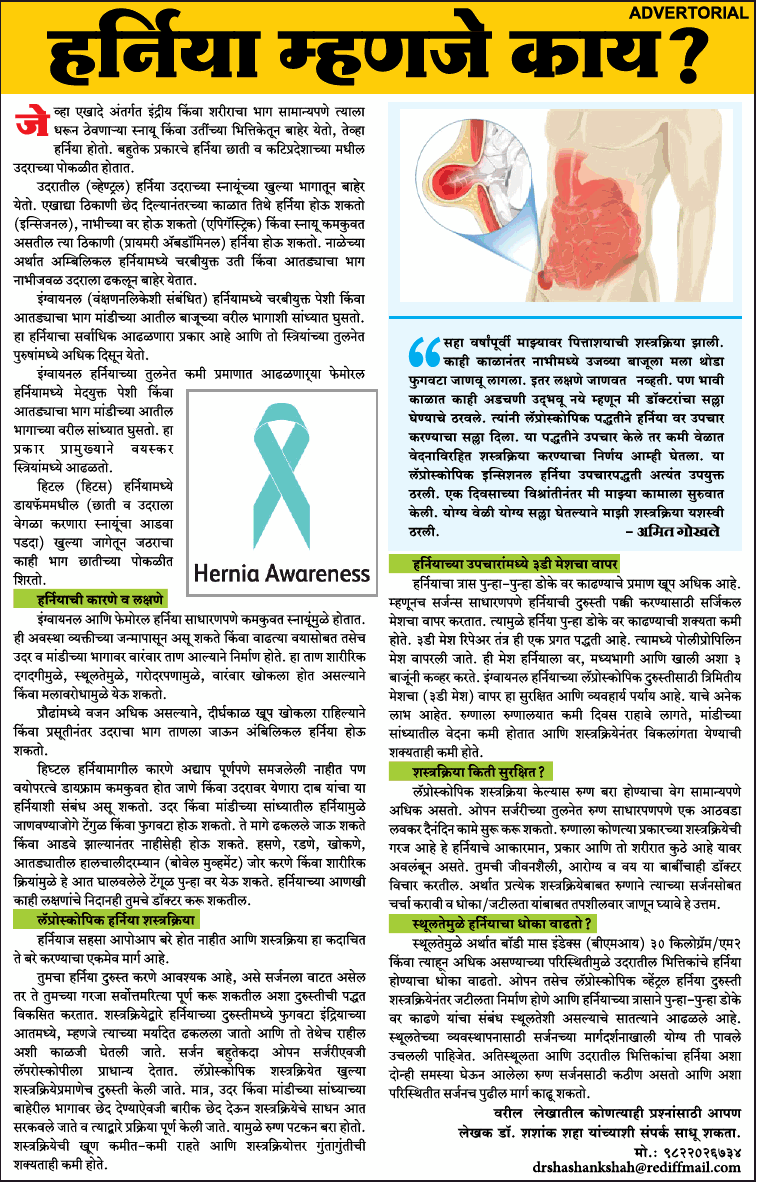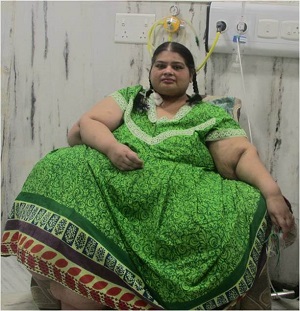TIMES HEALTH SURVEY 2025 RANKED LAPARO OBESO CENTRE AS INDIA’S 3RD BEST BARIATRIC HOSPITAL UNDER THE ALL INDIA LIFESTYLE HOSPITALS & CLINICS CATEGORY
INDIA: 26 Sep 2025, With this expansion, Pristyn Care now has 9 hospitals with over 500 beds and 2,00,000+ sq. ft. of advanced medical infrastructure, supported by 450+ medical professionals across India.
Read moreAmerican doctor treated at LOC Successfully by Dr Shashank Shah & Dr Sushil Kharat for complex hiatus hernia & reflux disease.
An American dentist, Dr. Jeffrey Mason, successfully underwent a complex revision surgery for hiatus hernia and reflux disease at Laparo Obeso Centre , Pune. After facing complications in the U.S., he chose Dr. Shashank Shah and Dr. Sushil Kharat for expert care. The surgery was performed with precision, ensuring a safe recovery — another proud moment of global trust in Indian medical excellence.
Read moreObesity could become public health crisis in India if left unchecked, say health experts
As obesity surges in India, experts highlight the urgent need for awareness and prevention. Unhealthy diets and inactive lifestyles are key contributors. Long-term solutions lie in sustainable lifestyle changes, not quick fixes.
Read moreIs there no way to stop this?’: Hit by hereditary blood disorder across 3 generations, Pune family wonders how many more
Six-year-old Anvika Nevse has changed out of her hospital gown and into a white frock, waiting eagerly for the doctor’s go-ahead to leave. It has been a week since her spleen and gallbladder were removed at Dr Shashank Shah’s Laparo-Obeso Centre in Pune and she is ready to go home.
Read moreकोल्हापूरच्या रुग्णाला पुण्यातील डॉक्टरांनी दिले जीवनदान
काही लोकांना बसल्या-बसल्या झोप लागते. पण मला गाडी चालवतानाही डोळ्यावर गुंगी येत होती. वजन १४० पर्यंत वाढले होते. नंतर तर मला श्वास घ्यायला त्रास होऊ लागला. ऑक्सिजनचे प्रमाण ७३ टक्क्यांपर्यंत कमी आले. त्यावेळी डॉक्टरांनी व्हेंटिलेटर लावला,” वयाची पन्नाशीही न ओलांडलेले प्रकाश तासगावकर ‘सकाळ’शी बोलत होते.
Read moreHealth Wishlist: Here’s what Pune is wishing for in 2024
Improving traffic control to reduce accidents in the city, creating a supportive environment for doctors in all hospitals, making insurance rules clearer, and increasing the number of beds in government hospitals are among the top priorities on the medical community’s wish list for 2024.
Read moreनवीन वर्षात लठ्ठपणाने नवे निकष
तुमचे वजन जास्त आहे का? तुमचा ‘बीएमआय’ (बॉडी मास इंडेक्स) वाढला आहे का? असे असेल तरीही नवीन निकषांनुसार तुम्हाला लठ्ठ म्हटले जाणार नाही. पण, त्यामुळे तुमच्या शारीरिक हालचाली मंदावल्या असतील, मधुमेह, उच्चरक्तदाब यासारख्या सहव्याधी असल्यास तसेच, मानसिक ताणतणाव असेल तर मात्र तुम्ही लठ्ठ आहात, असे म्हटले जाईल.
Read moreAround 1000 stones removed from 30-year-old Pune woman’s gallbladder
A 30-year-old woman from Pune suffered severe abdominal pain during her pregnancy and tests indicated she had developed gallstones that interfered with the normal functioning of her organs. While a surgery was postponed due to her pregnancy, she eventually underwent a 20 minute procedure involving three punctures to remove as many as 1,000 tiny stones, measuring 1-2 mm, from the gallbladder
Read moreबापरे! प्रसूती झालेल्या महिलेच्या पित्ताशयातून १०-१२ नाही तब्बल हजाराहून अधिक खडे काढले
काही दिवसांपूर्वीच प्रसूती झालेल्या एका तीस वर्षीय महिलेच्या ओटीपोटात तीव्र वेदना होत असल्याने डॉक्टरांनी 'सोनोग्राफी' केली. या महिलेच्या पित्ताशयात खडे तयार झाल्याचे 'सोनोग्राफी' मध्ये दिसून आले. बाळाला नियमित स्तन्यपान करावे लागत असल्याने शस्त्रक्रिया पुढे ढकलण्याचा निर्णय डॉक्टरांनी घेतला. मात्र, ओटीपोटात वारंवार तीव्र वेदना जाणवू लागल्याने डॉक्टरांनी शस्त्रक्रिया करण्याचा निर्णय घेतला आणि अवघ्या २० मिनिटांत पित्ताशयातील सुमारे एक हजारहून अधिक खडे काढून या महिलेला वेदनामुक्त करण्यात डॉक्टरांना यश आले.
Read moreबेरियट्रिक सर्जरीने 30 किलो वजन घटले आणि अन्नाची अलर्जीही पळाली
प्रिती सेखसारियाचा प्रेरणादायी प्रवास शोधा कारण तिने डॉ. शशांक शाह यांच्यासोबत बॅरियाट्रिक सर्जरीबद्दलची तिची वैयक्तिक गोष्ट शेअर केली आहे. शस्त्रक्रियेपूर्वी, तिला तिच्या वजनामुळे उच्च BMI, उच्च रक्तदाब, चक्कर येणे आणि गुडघेदुखी यासारख्या अनेक आव्हानांचा सामना करावा लागला. पण डॉ. शहा यांच्या पाठिंब्याने तिने प्रक्रिया पार पाडण्याचा निर्णय घेतला.
Read moreEffective strategies for parents to tackle uncontrolled obesity in children
According to the World Health Organization (WHO), the prevalence of overweight and obesity among children and adolescents aged 5-19 has risen dramatically from just 4 per cent in 1975 to just over 18 per cent in 2016. The problem is even more grievous in India with a predicted 27 million children to be diagnosed with obesity by 2030, as per UNICEF’s World Obesity Atlas 2022.
Read moreSurgeon recommends lifestyle modification over quickfix solutions for weight loss
Luckily for overweight people, modern science has now recognised 'obesity' as a lifestyle disease that can affect anyone from the middle to the upper-middle classes of society, in any age group.
Read moreकाही वर्षात जगातील 90 टक्याहून अधिक लोकांना जडणार लठ्ठपणा, तज्ज्ञांनी केला दावा
Obesity Causes and Effects : जंकफूड, खाण्यापिण्याची बदलेली शैली व योग्य वेळी आहार न घेण्याच्या चुकीमुळे आपल्याला आरोग्याच्या अनेक समस्यांना सामोरे जावे लागू शकते. सध्या लठ्ठपणा हा आपल्या देशात होणाऱ्या मृत्यूंच्या संभाव्य कारणांपैकी एक महत्वाचे कारण आहे.
Read moreMumbai reports a concerning 13% obesity rate among government employees
According to the article, the prevalence of obesity among government employees in Mumbai has reached 13%. This alarming statistic highlights the urgent need for effective obesity treatment and management strategies.
Read moreDiscover the connection between controlling diabetes and metabolic surgery
The article sheds light on the significant role of metabolic surgery in managing and controlling diabetes. Dr. Shashank Shah, an esteemed obesity expert and bariatric surgeon, provides insights into the positive impact of metabolic surgery on diabetes reversal and improved metabolic health.
Read moreIgnoring the treatment of obesity can have serious consequences
According to the article, Dr. Shashank Shah, an esteemed obesity expert and bariatric surgeon, highlights the alarming trend of neglecting obesity treatment, especially among children.
Read more
Don't delay your obesity treatment until it's too late
According to the article, many individuals with obesity tend to postpone their treatment until complications become inevitable.
Read more१३६ किलोचे वजन घटवून केले १०१, वयाच्या ६२ व्या वर्षी तिने पूर्ण केलं जगन्नाथ मंदिर चढण्याचे स्वप्न
Weight Loss Success Story : मुंबईतील एका ६२ वर्षीय महिलेनं एका वर्षात तब्बल ३५ किलो वजन कमी घटवले आहे. या महिलेचं वजन १३६ किलो इतके होते. आता या महिलेचं वजन १०१ किलो इतके झाले आहे.
Read moreKnow how eating high fat and high calorie foods can rewire your brain to eat for pleasure, cause obesity
Next time you pop that biscuit absent-mindedly or reach out for the packet of chips out of habit while hammering away at your keyboard, know that you are not only loading up on calories, you are also delaying their digestion as fatty, junk foods dull your gut responses.
Read moreGiant tumour in goldsmith’s belly stays hidden for a year in Pune
PUNE: Doctors took almost a year to figure out that a Satara goldsmith’s prominent belly had a massive tumour weighing 6.2kg.
Read moreAndhra Pradesh man, 80, oldest person in India to undergo obesity surgery
PUNE: An 80-year-old man from Anantapur in Andhra Pradesh has become the oldest person in India to undergo weight-loss surgery.
Read moreFelicitation for Hon Mrs. Sunetra Ajit Pawar
Felicitation for Hon Mrs. Sunetra Ajit Pawar Vahini, Founder at Environmental Forum of India who inspired us to take the initiative to improve the environment by giving saplings to the discharged patients at Laparo Obeso center which can help in bringing awareness of planting trees among people.
Read moreA Social initiative has been taken by Laparo obeso centre
A Social initiative has been taken by Laparo obeso centre along with Hon Public Health minister, Shri Rajesh Tope, Govt of Maharashtra to spread awareness about obesity and diabetes and it will be implemented through digital platform to educate people at grassroot level by providing health and diet tips
Read moreHernia surgery conducted on dog for first time in India
Dr Shashank Shah, Chief Surgeon and Founder at Laparo Obeso Centre has successfully conducted Hernia Surgery on a dog for the first time in India featured in indian express and decanherald. Hiatus Hernia surgery is a complex and skilled laparoscopic procedure. It is more delicate when we operate in a smaller space on a dog and with more liver loves
Read moreLaparoscopic sleeve gastrectomy surgery on Pet Dog
Dr. Shashank Shah performed laparoscopic sleeve gastrectomy surgery on a 50 kg 7-year-old Pet dog named Deepika. This was the first and one-of-a-kind operation done on an animal in India. You can read the complete article regarding this surgery which has been published in different newspapers and as showcased on many Television channels.
Read moreलठ्ठपणा सतावतोय बॅरिऍट्रिक सर्जरी एक वरदान
लठ्ठपणामुळे तुम्ही ग्रस्त असाल किंवा तुम्हाला तुमचा लठ्ठपणा/वजन कमी करायचे असेल तर बॅरिऍट्रिक सर्जरी हा एक चांगला उपाय तुमच्यासमोर आहे. ह्या सर्जरीमुळे लठ्ठपणामुळे पुढे उद्भवू शकणाऱ्या कॅन्सरची शक्यता कमी होते तसेच हृदयरोग, स्लीप अप्निया, टाइप २ मधुमेह, उच्च रक्तदाब, फॅटी लिव्हर, ब्रेन स्ट्रोक यांसारख्या विविध आजारांचा धोका कमी होतो. याव्यतिरिक्त अजूनही बरेच आजार लठ्ठपणाशी निगडित आहेत त्यांचाही धोका कमी होतो. लठ्ठपणा हा प्रमुख आजारांपैकीच एक आहे पण लोकं तसे मानत नाहीत ही खरंतर दुर्दैवी बाब आहे.
Read moreKnee Pain and its Relation to Excessive Weight
Did you know ? Excess weight can have adverse effects on our bone strength which causes joint pain while doing simple activities like walking or climbing stairs. Knee pain happens when you are overweight. Immense pressure is exerted on your knees with each step while walking on the non-inclined surface. Read Dr Shashank Shahs article in Times of India and Learn more on knee pain and its relation to Excessive weight.
Read moreस्थूलतेच मूळ कशात आहे?
लहान मुलांमध्ये छातीचे प्रमाण वाढताना दिसतं, मुलींमध्ये चेहऱ्यावर केस येतात. त्यावरच्या उपचारांचे प्रमाण वेगाने वाढताना आपल्या दिसते. चेहऱ्यावर पिंपल्स येतात. पॉलिसिस्टीक ओव्हरियन डिसिज (पीसीओडी) वाढतोयं. पूर्वी प्रसूतीनंतर महिलांना येणारे स्ट्रेच मार्क आता लहानपणीच मुलांच्या अंगावर दिसत आहे. या सगळ्याच्या उपचारांसाठी पालक वेगवेगळ्या ठिकाणी धावताना दिसत आहे. ही सगळी लक्षणे म्हणजे शरीरातील चयापचयाची क्रिया बदल असल्याची ठळक लक्षणे आहेत.
Read moreलठ्ठपणा आणि मधुमेह
भारतामध्ये मधुमेहाच्या ९० टक्के रुग्णांना ‘टाइप २’ प्रकारचा मधुमेह असतो. या रुग्णांमध्ये चरबीचे प्रमाण जास्त असते. लठ्ठपणा आणि मधुमेह एकत्र आला, की व्यक्तीला खूप भूक लागते. गोड खाण्याची इच्छा होऊ लागते. अतिलठ्ठ व्यक्तीला मधुमेह झाल्यानंतर वेगवेगळ्या संप्रेरकाच्या प्रभावामुळे आहाराची शिस्त पाळणे अत्यंत अवघड किंबहुना अशक्यल होते. त्यामुळे, मधुमेहाची भविष्यात होणारी गुंतागुंत लवकर उद्भघवण्याची शक्यअता असते.
Read moreलठ्ठपणा आणि हर्निया
हर्निया म्हणजे नाभीखाली किंवा जांघेत आलेला फुगा होय. हर्नियाचे वेगवेगळे प्रकार आहेत. हर्नियाने १४ वर्षांपूर्वी जागतिक विक्रम केला होता. तेव्हा एकूण रुग्णांपैकी ९० टक्के रुग्णांमध्ये लठ्ठपणाचे प्रमाण नव्हते. पण, आता हर्नियाबरोबर लठ्ठपणा प्रकर्षाने जाणवत आहे. लठ्ठ रुग्णावर हर्नियाची शस्त्रक्रिया केली आणि रुग्णाने वजन कमी केले नाही, तर पोटावरील चरबीच्या ताणामुळे परत हर्निया होण्याचा धोका असतो.
Read moreRemove Obesity Operations From Elective List, says, surgeons
Elective surgeries are the ones which can be postponed or planned by the patient or the doctor as per their convenience. This can be done only because the diseases for which elective procedures are planned are not progressive nor life-threatening.
Read moreDoctors and nutritionists encounter rise in consultations for weight gain
City-based bariatric surgeon Shashank Shah receives no less than 10 calls every day from patients seeking help to reduce their weight gained over the period of lockdown. Even a normal healthy person has put on an average of 2-3 kg during the lockdown, he said
Read more42-year-old Vasai woman loses 214 kg to discover new life!
MUMBAI: It took Vasai resident Amita Rajani four years and two surgeries to lose 214 kg and walk independently. On Wednesday, Rajani spoke about her life-changing transformation from 300 kg to 86 kg and her quest to get into The Limca Book of Records.The surgeon who performed bariatric or weight-loss surgery on Rajani, Dr Shashank […]
Read moreLaparo-Obeso Centre Becomes Pune's First Patient-Centric Digital Health Provider
MUMBAI: It took Vasai resident Amita Rajani four years and two surgeries to lose 214 kg and walk independently. On Wednesday, Rajani spoke about her life-changing transformation from 300 kg to 86 kg and her quest to get into The Limca Book of Records.The surgeon who performed bariatric or weight-loss surgery on Rajani, Dr Shashank […]
Read moreSam Sanjivani TV Program on Obesity
A great program on Sam TV the Sam Sanjivani program on obesity.  Dr Shashank Shah spoke about the various treatment options available for obese patients. He spoke about how Obesity is now considered a disease and there are some excellent surgical options like the Sleeve Gastrectomy (a procedure patented and mastered by Dr Shah himself) or […]
Read moreIndian Medical Association Belgaum Felicitates Dr Shashank Shah
Great honour for Dr Shashank Shah to be invited as a guest faculty for prestigious oration of the year 2016 , Belgaum Medical Association!! Thank you IMA Belgaum and Dr Neeta Deshpande for this invitation and for the best choice for oration. What a grand function and late Dr Metgud oration it was!!
Read moreDNA September 20
Mumbai: Shreejit Hingankar of Pune is just 10 months old. But he weighs 17 kg. Doctors say he suffers from Leptin gene mutation deficiency, which causes obesity. .[…]
Read moreDoctor adopts ten-month-old weighing 17 kg
It has been a harrowing time for Amol and Rupali Hingankar from Bhosari whose confusion over the abnormal weight gain of their new-born son Shreejit soon rose to despair when he weighed an unbelievable 17 kgs at just ten months.[…]
Read morePrestigious award for our contribution to the Health & Wellness Sector in the Idols of Maharashtra
It was such a great honour to receive this prestigious award for our contribution to the Health & Wellness Sector in the Idols of Maharashtra awards 2022 ceremony organized by Sakal Media Group on 18th April at JW MARRIOT, Senapati Bapat Road, Pune.
Read moreFree Awareness Programs On Myths & Facts about Obesity by Dr.Shashank Shah
LOC has organized a Free Awareness Program On Myths and Facts of Obesity by Dr.Shashank Shah in 19th December at Emerald Park Hotel, Saharanpur Link Road, Nashik.
Call us on 08065423726 for more queries.
Read more1st International Nutribolism Conference
LOC has organized the 1st International Nutribolism Conference at Hotel Renaissance,Powai . Here are the glimpse of the team working behind the success of the Conference.
Read moreWish to register but haven't?? Hurry up...limited seats left
Ms. Radhika Shah and the entire organizing committee would like to urge you not to miss this wonderful opportunity to get practical knowledge from the best practicing faculty in the field of nutrition and dietetics.
Avail the most interesting certificate course....!
For registration can contact: 9922967846 / 7387667124 / 9823082172 or visit - http://nutribolism2020.com
Read moreObesity and mental health: understanding the correlation with dr. Shashank shah
Stigma is a fundamental cause of health inequalities, and obesity stigma is associated with significant physiological and psychological consequences, including increased depression, anxiety and decreased self-esteem. Watch Dr. Shashank Shah live on 20th December 2020 at 12 pm noon talking on the topic obesity and mental health at FbLive @obesityasia
#sciencesunday #loc #indiafightsobesity #mentalhealth #obesityandmentalhealth
Read moreObesity and Gynecomastia understanding the correlation with Dr. Shasahank Shah, Leading Bariatric Surgeon
This is because being overweight can increase levels of oestrogen, which can cause breast tissue to grow. If you're overweight you're also more likely to have excess fat that can enlarge the breast tissue.
Catch Dr. Shashank Shah live on Sunday 13th December at 12 noon on topic obesity and gynaecomastia at FBLive @obesityasia #sciencesunday #Loc #Indiafightsobesity #obesity # gynaecomastia #obesityand gynaecomastia
Read moreVirtual Discussion on Obesity and Diabetes
Whether you are just starting to research about weight loss program or planning to undergo one. Watch Dr Shashank Shah, India’s leading bariatric surgeon along with other experts in the field of Endocrinology and Obesity in one of its kind Virtual Discussion on Obesity and Diabetes at www.facebook.com/Realize/from 4 PM to 5 PM
Read moreEncourage Healthy Lifestyle
For most people trying to lose weight, it/s a struggle. It takes more than good intentions and a lot of will power. Participating in a weight loss program with a group of friends may result in more weight loss than doing the same weight loss program alone. In a study, involving 166 people, 76 per cent [...]
Read moreAre you struggling to drop kilos ?
INDIA’S Topmost Bariatric surgeon learn Scientific ways of losing and maintaining weight
Read moreTalk on Obesity-Myths and Fallacies
Know about myths and fallacies of obesity by Dr. Shashank Shah (Pune’s finest laparoscopic bariatric surgeon) live on IBN LOKMAT
Read moreWalk on fitter lifestyle with Dr. Shashank Shah’s Enriching Session
Newer ways of losing weight.The support group from 11 AM with Zumba Session + Dietician Session
Read more
